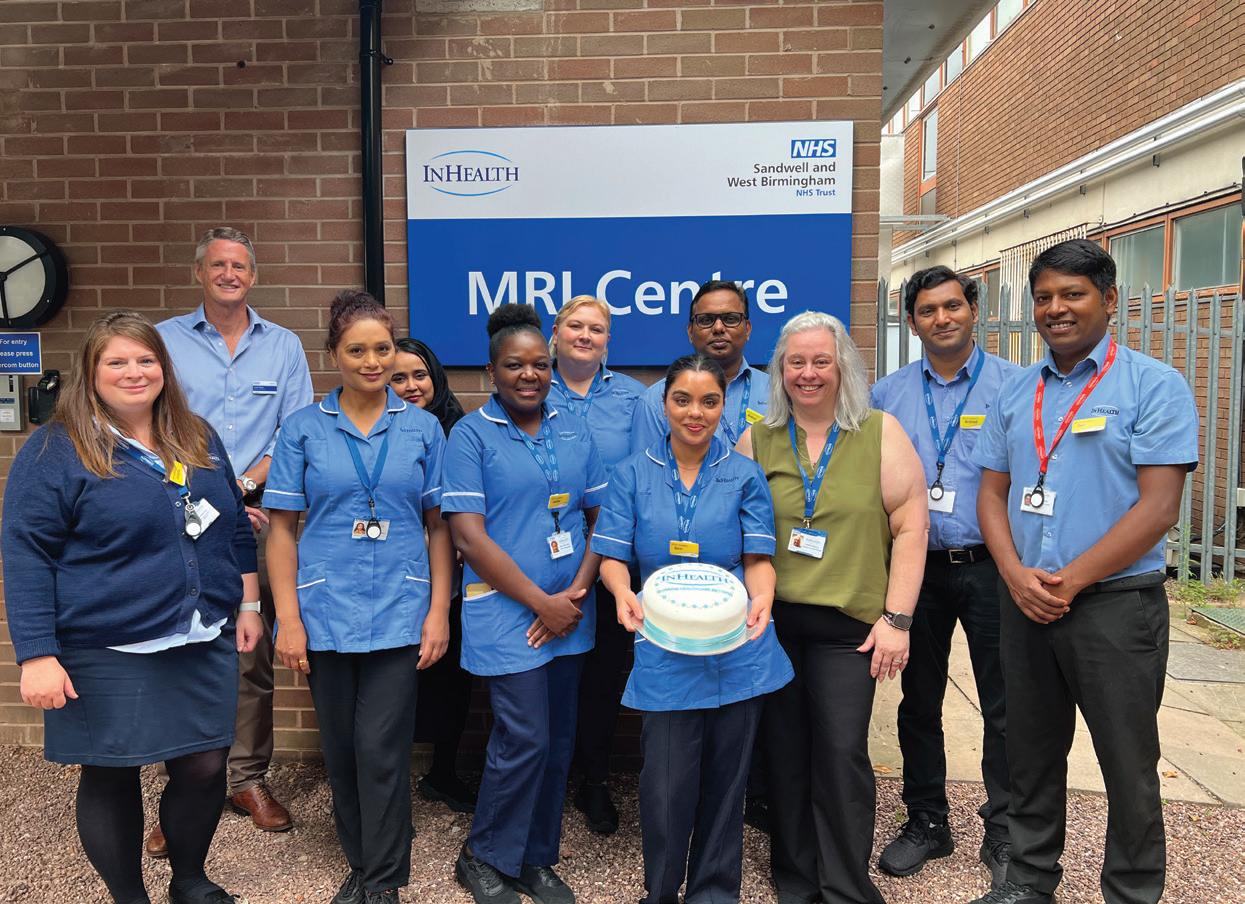
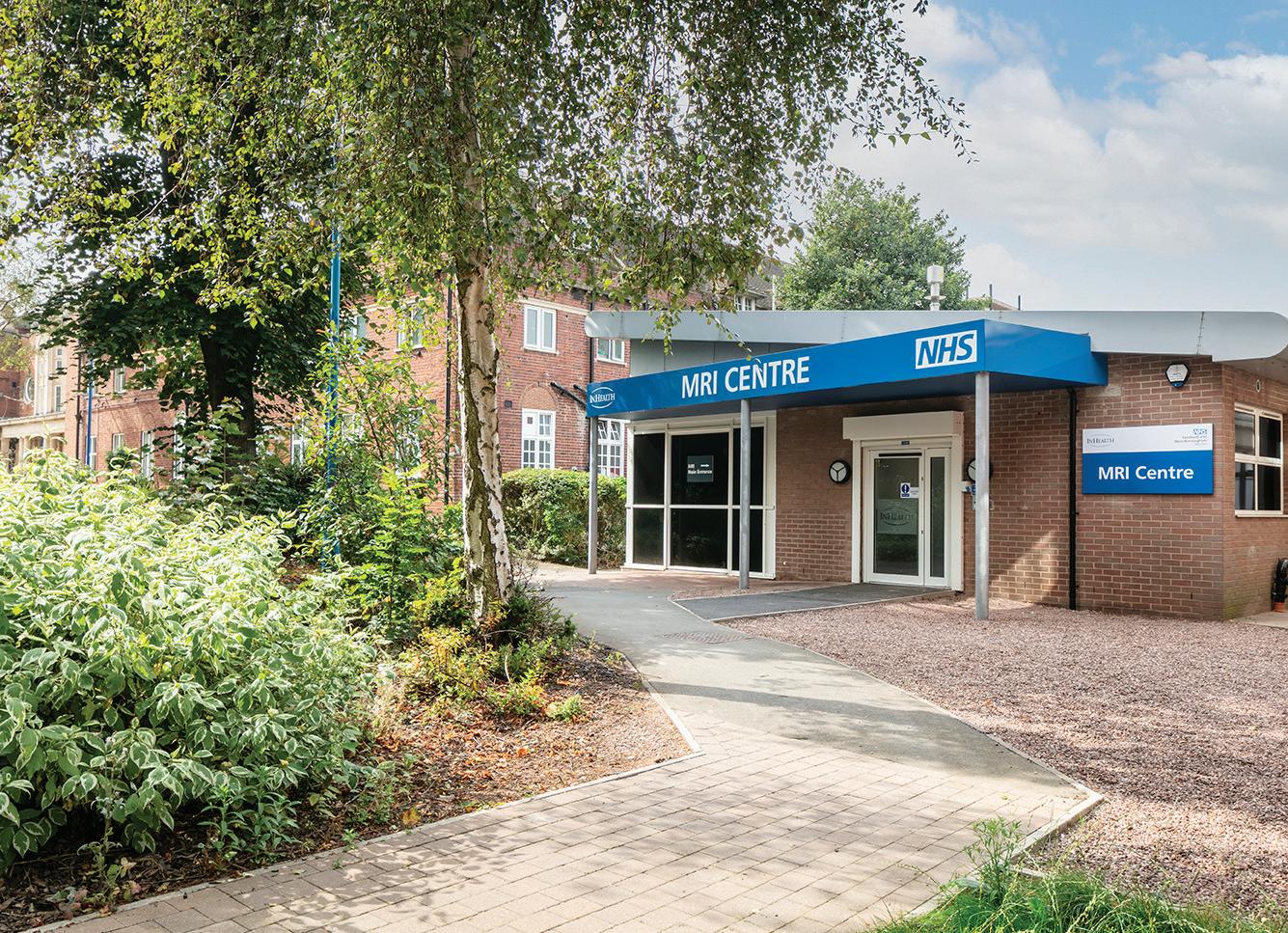
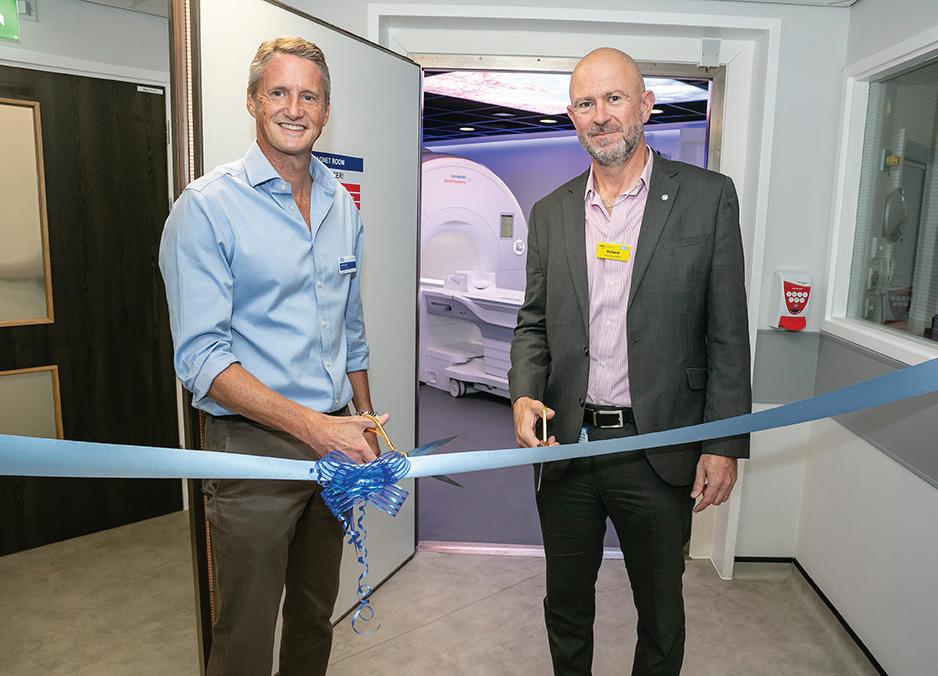
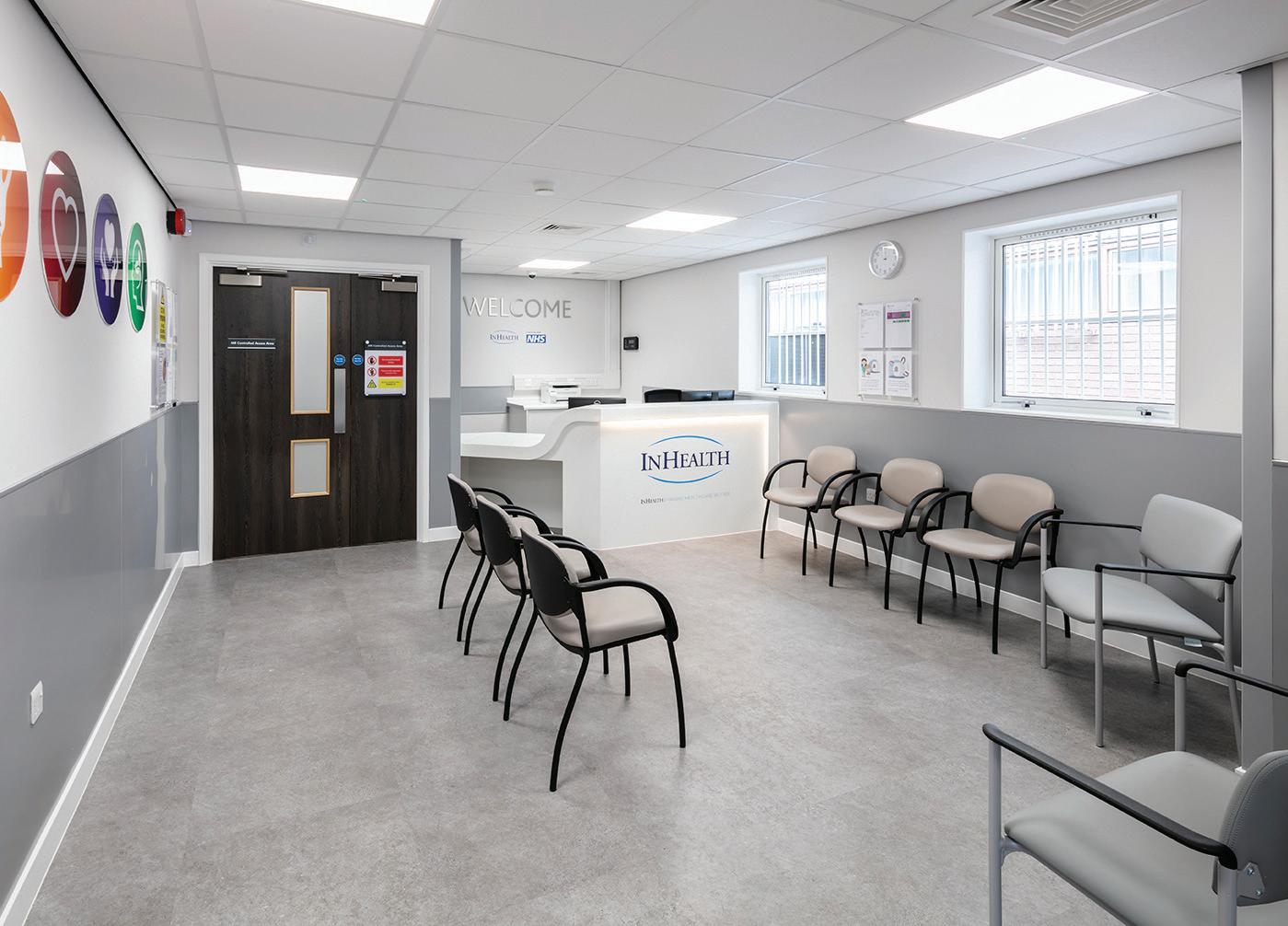
The pulse of community health, Leasowes, Rowley Regis, City Hospital, Sandwell General and the Midland Metropolitan University Hospital Issue 169 September 2023 Sandwell and West Birmingham NHS Trust It's Speak Up Month Pages 6-7 Guide to accessing services as winter approaches Pages 14-15 Celebrate Black History Month Page 5 Sickle cell training and awareness Page 20 New MRI centre opens at Sandwell General Hospital Pages 16-17 A state-of-the-art MRI centre has opened at Sandwell General Hospital
HELLO FROM THE CHAIR
Welcome to the September edition of Heartbeat.
This month, we're celebrating the opening of our new MRI centre at Sandwell Hospital, offering excellent services for our communities, on pages 16-17.
On pages 14-15, we've outlined a number of key services for colleagues and patients to be aware of throughout the winter period.
We have highlighted events taking place for Black History Month, notably "Staying Power: Unity through Community" on page five. We've also provided more information on a recent menopause event, as well as details on becoming a menopause champion or joining the Women's Network - see more on page 3.
Enjoy J
Lesley talks about...improvements in the radiology department
Lesley Writtle, Deputy Chair
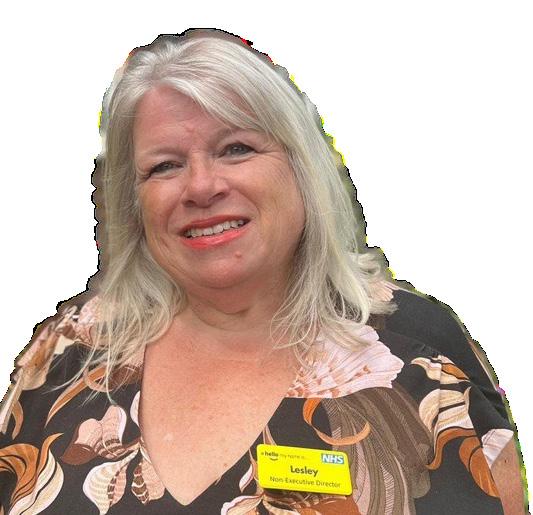
This month I visited the radiology department and saw the opening of the new MRI suite at Sandwell, which I have to say offers an exceptionally good service.
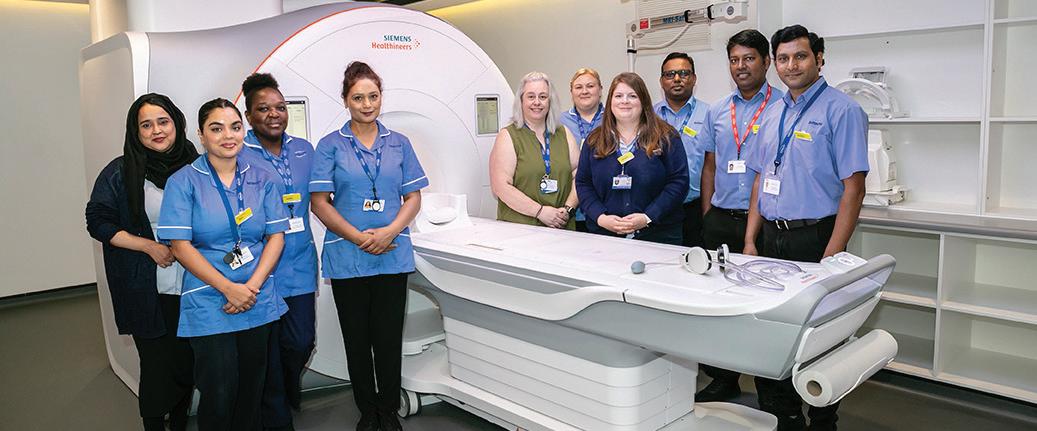
I spent time with CJ Browne, Group Director of Healthcare Professions, and Darren Smith, Group Director of Operations for Imaging and Pathology, looked at all the current departments at Sandwell, and met some of the staff. It’s clear that anticipating the development of services at MMUH is very exciting but challenging at the same time.
I heard that historically the imaging department had significant vacancies and lacked the necessary operational structure to make improvements. With that in mind the triumvirate leadership team took shape. The lead group director of health care professions post has been a very important development together with the development of a clinical strategy.
As I met staff in various departments, I noted that quality and safety of work are at the top of people’s thoughts – but I also heard that looking after staff and developing their careers at all levels is a priority.
The overarching view was that effective leadership cannot be underestimated. Supporting and cultivating good leaders is critical to seeing quality improvement. Delivering great care starts with staff who are happy, productive, and engaged in their work, and our staff survey results tell us that we must do better in creating a workplace where people can thrive.
Designed by Medical Illustration, Graphics Team Sandwell and West Birmingham Hospitals NHS Trust
If you’d like to submit an idea for an article, contact the communications team Ext 5303
swbh.comms@nhs.net
Stay updated
We send out a Communications Bulletin via email every day and you can now read Heartbeat articles throughout the month on Connect. Don't forget you can follow us on:
The radiology department has focussed on improving retention and developing the workforce as one of their primary objectives. To support this, a robust training programme has been developed. This dedicated AHP retention programme involved content derived from questionnaire responses, where staff were asked whether they would be interested in in-house development and training in specialist
areas. I heard that all staff now have a clear career pathway from entry grades upwards. Against the backdrop of operational pressures, concerted effort is now made to rebalance the need to staff our areas but also ensure training sessions are protected. This is mainly being achieved through careful forward planning of rotas, with appropriate skill mix up to three months in advance.
I was particularly impressed to hear about the radiographer apprenticeship and I had the opportunity to see this in practice.
To support our strategic objectives for our patients and population, it’s really important that we are actively engaging colleagues and service users to collectively influence change. In the department I saw a patient survey, designed with a QR code to collate feedback, is promoted across all of imaging waiting areas. Recently this was survey was sent out as a text message following an appointment within the imaging department.
121 responses had been received at the time I visited, showing:
• 87% of patients reported their service experience as being Very Good or Good.
• 93% of patients reported having confidence in the Radiography staff treating them.
This is a positive reflection of the high standards in imaging at the staff/patient interface.
Patients and their carers want to be involved in the decisions that impact on them, their health and the health of their loved ones. It is important that we understand what is important to our patients and their families. With the relaunch of Fundamentals of Care, the purpose of the plan is to improve the basic standards of care, restoring a sense of pride and aspiration in the care that we give so that staff are empowered to improve care every day.
Contact us
Communications Team Ext 5303 swbh.comms@nhs.net Communications Department Ground Floor, Trinity House Sandwell Hospital
Published by Communications Team Sandwell and West Birmingham Hospitals NHS Trust
Submit an idea
@swbhnhs
The opening of the new MRI centre at Sandwell
Honouring Krishna Janmashtami
CORPORATE AND GENERAL NEWS
together, preparing and sharing special food, night vigils, and visiting Krishna or Vishnu Mandirs (also known as temples).
To mark the occasion, our chaplaincy team hosted an event at City Hospital chapel with both clinical and non-clinical colleagues in attendance across all levels.
Rakesh Bhatt, Hindu Chaplain, facilitated the celebrations at City Hospital chapel and believes it was a huge success. He said: “It was great to see so many familiar and new faces come along and join in the festivities.
“This was our first Krishna Janmashtami event at the Trust but we hope to make it an annual celebration. Staff enjoyed the refreshments and it was nice to everyone enjoying the occasion together!”
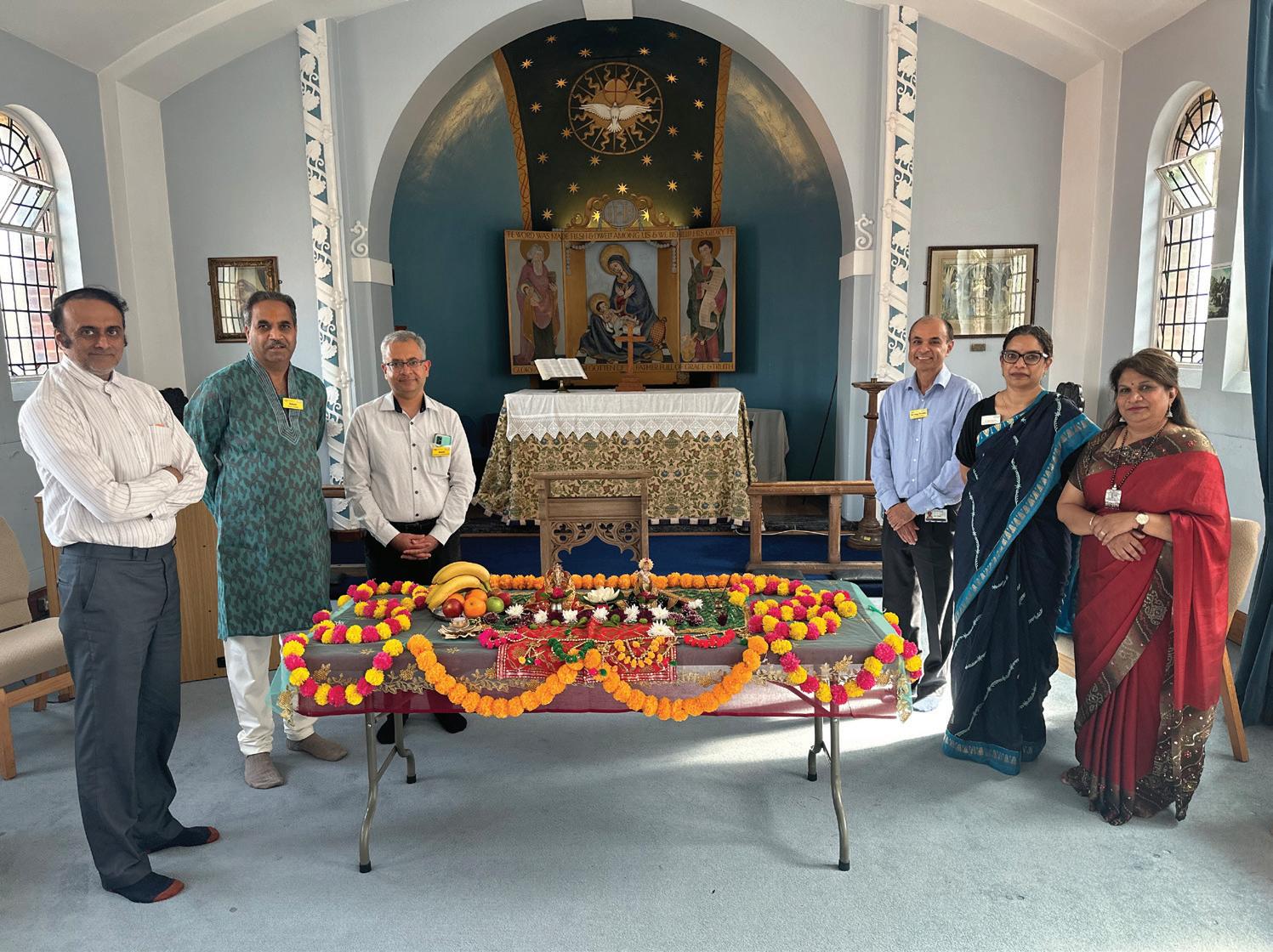
Colleagues mark Krishna Janmashtami at City Hospital chapel
We recently hosted a special celebration to recognise the birth of Hindu God, Lord Krishna.
The occasion, known as Krishna Janmashtami amongst the Hindu community, is a momentous occasion in the Hindu calendar as
it celebrates the birthday of Lord Krishna, the god of protection, compassion, tenderness, and love. Krishna is one of the most popular and widely revered Gods in the Hindu faith and culture.
Many Hindus across the globe celebrate Janmashtami by fasting, singing, praying
Rev Eddie Briones, Interim Lead Chaplain echoes these thoughts and said: “It was fantastic to see everyone celebrating together at City chapel. I must also say a massive thank you to everyone who helped in the organisation of this event as without their hard work and dedication it would not have been possible.”
Raising awareness of the menopause
The Women’s network recently hosted an event celebrating World Menopause Day focusing on raising awareness of cardiovascular disease in women.
Menopause effects women between the ages of 45- 55, however, 1 in 100 women can experience the menopause before the age of 40. During and after the menopause, women gradually produce less oestrogen, therefore increasing the risk of coronary heart diseases or strokes.
The event was hosted by Amber Markham, Group Director of Nursing – Surgical Services and Chair of the Trust’s Women’s Network. It included presentations from Dr Sarb Clare, Deputy CMO and Acute Medical Consultant and some SWB cardiologists, who all discussed different aspects of the menopause and the support available within the Trust.
As part of the Women’s Network, Amber has dedicated her time to ensuring the Trust provides additional resources for colleagues who are going through the menopause. These include self-referrals to occupational health, lightweight uniforms, and the Menopause Café.
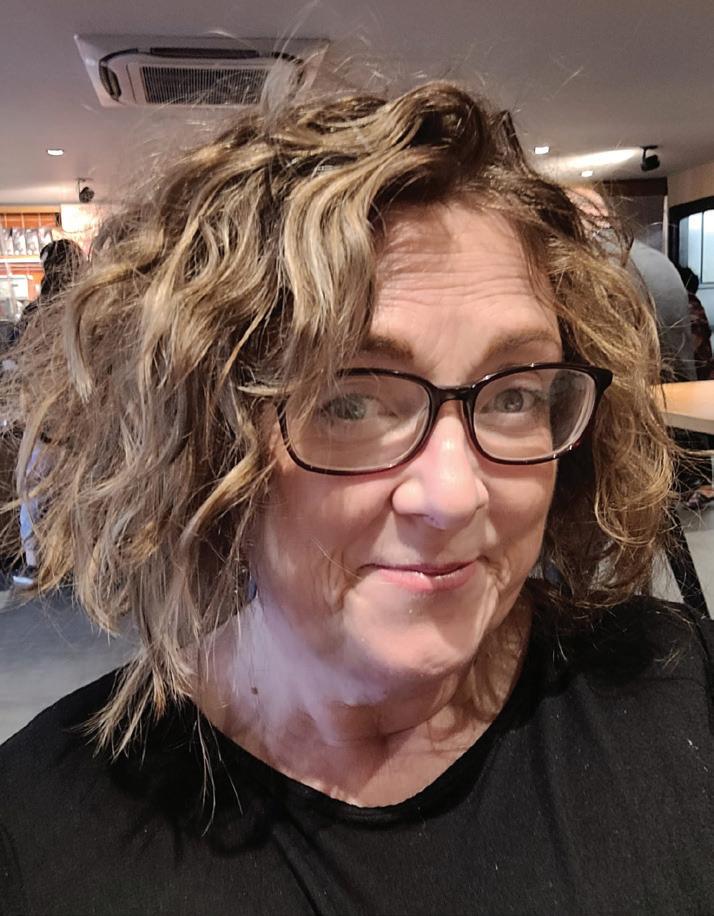
The Menopause Café, along with menopause champions, will be available to offer support and normalise the conversations around menopause and remove the ‘shame’ around the word. If you are interested in being a part of the conversation, the Menopause Café occurs every second Monday of the month, via Microsoft Teams.
If you are going through the menopause and need further information on how the Trust can support you, please visit the wellbeing pages on Connect, or if you are interested in joining the Women’s network, please contact Amber for more information: amber.markham@nhs.net
3
Amber Markham, Group Director of Nursing – Surgical Services and Chair of the Women’s Network
Focus on Finance: what’s happening at SWB?
By Dinah McLannahan, Chief Finance Officer
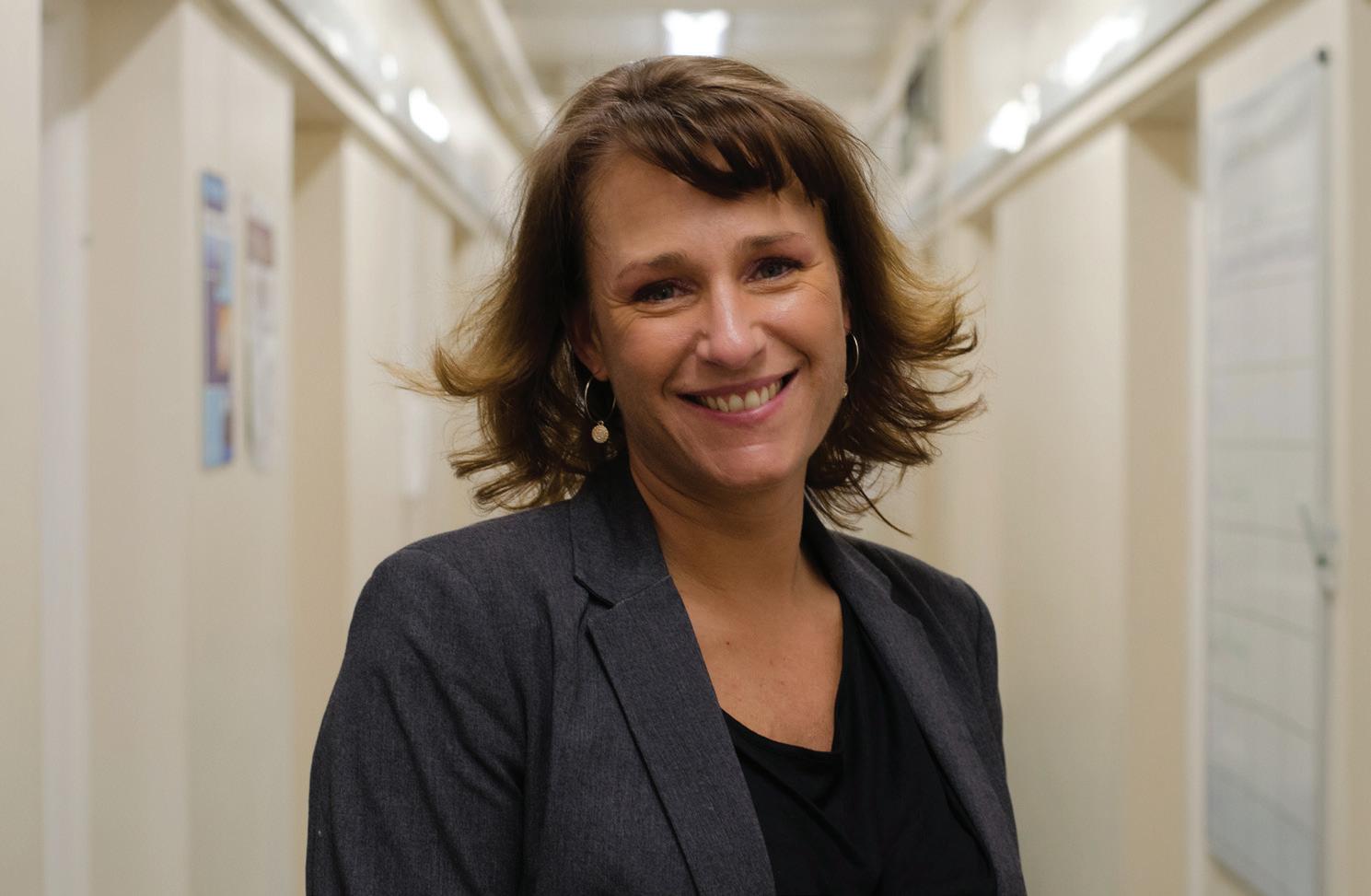
Our Trust has a relatively strong history of delivering on financial targets. Since the Trust was established in 2003, we have achieved a break-even position (where the amount we spend equals the amount of income we receive) or a surplus (where we receive more money than we spend) in every financial year, apart from 2016/17.
In March 2020, as we all know, COVID-19 struck. This completely changed the way the NHS is funded: the NHS saw significant growth in workforce usage alongside a drop in activity and therefore overall efficiency and productivity. Added to that, global macro-economic pressures mean that the money coming to the NHS is not enough to cover the costs of inflation. We, as a minimum, must reduce our costs by 4per cent each year, whilst not growing our workforce, as there is no money to do that.
Where are we now?
Post pandemic, the NHS is now managed on a system level for its financial targets. For this financial year 23/24, the system is planning for a deficit (in which money spent is more than money received) of £70m, and the Trust is at £18.8m deficit of that total. We will only achieve that target if:
• Industrial action is funded

• The MMUH care model is funded
• Excess inflation costs (mainly energy) are funded
• We manage the additional costs of winter and improve our financial recovery performance.

The Black Country system is not delivering the plan: put simply, our system deficit is already bigger at the end of August than it was planned to be at the end of March 24. We can only increase our income if we over-deliver against elective recovery targets. It does not matter how many people we see in urgent and emergency care; we receive the same amount of money for it.
In addition to the above, we have received significant national support to fund the readiness and construction of MMUH. We must hit our financial targets in order to ensure successful transition to the new hospital.
You may not know (or think about it!), but our Trust has a bank account with cash in it just like any other business. We need cash to pay you, our suppliers for the things we use in delivering care, and for works to our buildings, called our capital programme.
If we are in deficit, this eats up the cash that we have in the bank and makes it more difficult to pay our suppliers on time or fund our capital programme.
To overcome this, we must focus on being as efficient and productive as we can be. Wasting money or not making best use of our resources has never been ok, and is certainly unacceptable in the current climate.
What can we do about it?
Most of all, financial governance, also known as grip and control, is what we absolutely must ensure. This means tightly managing all the big things that have an impact on how well we use our valuable and limited resources. Examples of this include;
1. Ensuring you have a budget for everything you spend
2. Adhering to purchasing processes that ensure good value
3. Managing sickness in line with policies and ensuring your team is a place where your colleagues want to be
4. If you’re a budget holder, ensuring that the costs and people on your monthly budget statement are the right ones and are being paid accurately
5. Speaking to your finance manager regularly
6. Being aware of where your team wastes money or resources and developing a plan to address it.
How can you help?
We would like your ideas about how we can work better and more efficiently whilst maintaining safe quality care. You can do so by visiting www.surveymonkey.co.uk/r/ Focusonfinance
4 CORPORATE
AND GENERAL NEWS
Dinah McLannahan
Recognising 2023
CORPORATE AND GENERAL NEWS
Black History Month recognises the contributions and achievements of Black people to British society, as well as raising awareness and understanding of Black history. Furthermore, it provides an opportunity to empower future generations.
There are a number of events taking place throughout October to mark Black History Month.
On Wednesday 11 October, in partnership with the University of Birmingham and Recognize Black Heritage and Culture, SWB is hosting
Staying Power: Unity through Community.
Taking place at the Exchange, 3 Centenary Square, from 18:30-20:30, the evening will see perspectives from academics, students, and artists from across the West Midlands.
Marking the 75th anniversary of the arrival of HMT Empire Windrush, this event will examine the history of migration linked to the Windrush community, celebrating the valuable contributions made by the community.
The evening will also include the premiere of a new film, Staying Power: Unity through Community. The film revisits participants,
including colleagues from SWB, from the original Here to Stay photographic exhibition, commissioned to mark the 70th anniversary of the arrival of HMT Empire Windrush and the birth of the NHS.
To register for the event, visit: https://www. blackhistorymonth.org.uk/article/listings/ region/birmingham/staying-power-unitythrough-community/
To see other events in the region, please visit: https://www.blackhistorymonth.org.uk/ listings/region/birmingham/
5
up
Celebrating Speak Up Month during October
Many of you will have heard the terms Freedom to Speak Up, Speaking Up or Freedom to Speak Up Guardians – but what exactly does this all mean?
Freedom to Speak Up is for anyone who works in health – this includes any healthcare professional, non-clinical workers, any level of manager, students, volunteers, locum, bank and agency workers.
When things go wrong, we need to make sure that lessons are learnt, and things are improved.
If we think something might go wrong, it’s important that we all feel able to speak up to stop potential harm.
Speaking up can take many forms. It could be a quick discussion with your line manager, a comment you leave as part of completing your staff survey, or you may feel you want to speak to one of our dedicated Freedom to Speak Up Guardians.
SPEAK freedom to up SPEAK freedom to
At SWB, we currently have 16 Freedom to Speak Up Guardians, working across all areas of the organisation. They have all undertaken specialist training provided by the national guardians office to ensure they are able to provide you with the most appropriate help and support – all of their details can be found on the opposite page.
October is national Speak Up Month – a month to raise awareness of Freedom to Speak Up and making Speaking Up business as usual for everyone.
We spoke to Jamil Johnson, Freedom to Speak Up Lead to find out more: “There are lots of things that can prevent people from speaking up – during October we want to try and break down some of those barriers and to normalise Speaking Up across the Trust.
“We will be highlighting some of the barriers, which we hope will give people the confidence to overcome them and make Speaking Up business as usual.
“Throughout the month, myself and the other Freedom to Speak Up Guardians will be visiting colleagues across the Trust to talk to them about the importance of Speaking up, and we will also be seeing our senior leadership speaking about it too.
“On 17 October, we are asking people to showcase their support for Speaking Up by wearing green – there will be a prize for the best dressed green team!
“Speaking Up shouldn’t be something to fear – it is an incredibly important part of ensuring that we are always striving for continuous improvement and I hope that during October, we can showcase this.”
For more information, visit the Freedom to Speak Up Guardians page on Connect – you will find it under staff zone.
6.
Our guardians
• Sandra Kennelly – Sandra works in the community as a Clinical Team Leader/ Occupational Therapist with Primary Care, Community and Therapies. Email: sandra.kennelly@nhs.net
• Harpal Tiwana – Harpal works in Primary Care, Community and Therapies as a Service Manager. Email: harpal.tiwana@nhs.net
• Cheryl Newton – Cheryl is the Group Director of Nursing for Women and Child Health Group. Email: cheryl.newton@nhs.net
• Jenny (Jennifer) Caradine – Jenny is an advanced physiotherapist working within T+O, she is currently on secondment on the MMUH project. Email: Jennifer.caradine@nhs.net
• Chris (Christina) Ronayne – Chris is the lead Professional development nurse working within acute medicine Email: christina.ronayne@nhs.net
• Jamie Emery – Jamie is the lead for patient involvement and insight. Email: jamie.emery2@nhs.net
• Patreece Wright – Patreece is one of the clinical nurse practitioners who is part of the hospital at night team. Email: patreece.wright@nhs.net
• Pardeep Jagpal – Pardeep is the clinical manager for the National Poisons Unit in Birmingham. Email: pardeep.jagpal@nhs.net
• Raj Bector – Raj is the programme manager for the primary care, communities and therapies directorate. Email: rajesh.bector@nhs.net
• Anser Khan – Anser works within the security team as a security officer and is also the chair of the Muslim liaison group. Email: anser.khan@nhs.net
• Yvette Malcolm – Yvette works within radiology as a senior radiographer. Email: yvette.malcolm@nhs.net
• Trina Price – Trina is a staff nurse who works within the outpatient department. Email: trina.price@nhs.net
• Essie Li – Essie works as the head of transformation, working within the improvement team. Email: essie.li@nhs.net (She officially starts in October).
• Iain Johnston Charles – Iain works within the Infection control and prevention team as a Senior Infection Prevention and Control Nurse Advisor. Email: iaincharles.johnston@nhs.net
• Wendy Morris – Wendy works within the Primary Care, Community and Therapies as a Clinical Service Lead Integrated Care (Cardio-Respiratory Services. Email: wendy.morris@nhs.net
• Jamil Johnson – Jamil is the current Freedom To Speak Up Lead. Email: jamiljohnson@nhs.net
• Emma Barton – Emma is the Freedom To Speak Up Lead (She is currently not undertaking this role and is undertaking Trade Union duties within the trust) Email: emma.barton1@nhs.net
• Dinah McLannahan – Dinah is our Chief Finance Officer and our Executive representation for speaking up. Email: dinah.mclannahan@nhs.net
You can also email: swbh.freedom-to-speak-up-guidance@nhs.net
7.
Procurement 'Best' rating
CORPORATE AND GENERAL NEWS
In an achievement that underscores our unwavering commitment to excellence and continuous improvement, we are thrilled to announce that our Trust, as part of the Black Country Alliance (BCA), has reached the pinnacle of success in the Commercial Continuous Improvement Assessment Framework (CCIAF), which assesses procurement team capability. We have proudly secured the coveted 'BEST' rating, a significant milestone that reflects our dedication to delivering the highest standards of procurement and commercial excellence within the NHS. Sharing the news of the achievement, Black Country Alliance Director of Procurement Mike Hanson said: “To fully appreciate the significance of our achievement, it's essential to recognise the journey that brought us here. Before the implementation of CCIAF, we had reached level two in the NHS Procurement and Commercial Standards, a commendable accomplishment in its own right. At the time, level three was the unattainable summit that no Trust had managed to reach.
The procurement team celebrate their 'Best' accreditation
“However, the standards underwent a transformation, aligning with the government and Cabinet Office's vision, and thus, CCIAF was born. The new framework introduced a simpler yet more aspirational tiered rating system –'Good,' 'Better,' and 'Best,' with the latter being the equivalent of the previous level three.
“We eagerly embraced this opportunity for evaluation, opting to be among the early cohorts for review. True to our commitment to excellence, we set our sights on the highest level possible, 'Best,' believing that this is where our tireless efforts over the past few years had positioned us.
“Our submission underwent a rigorous peer review process and a separate evaluation by the Cabinet Office. The results left us elated and
profoundly proud. We not only attained 'BEST' status but did so by a remarkable margin. Our score of 96.7 per cent is nothing short of incredible, underscoring the exceptional strides we've made in ensuring our processes, procedures, and operations are second to none.
“This achievement goes beyond mere numbers; it is a resounding validation of our team's unwavering commitment and the consistent excellence delivered by the Black Country Alliance. Over the past twothree years, we have consistently risen to the challenge and have set new standards for excellence within the NHS.
“It is clear from the results that we currently stand among the highest-scoring Trusts across the entire NHS landscape. Our Trust is setting an inspiring example for others to follow, and we must continue to drive innovation, maintain transparency, and foster collaboration in our pursuit of excellence. Together, we can achieve even more and continue to provide exceptional care to the communities we serve.”
Congratulations to each and every member of the Black Country Alliance procurement team for this remarkable achievement! Our 'Best’ rating is a testament to your hard work, dedication, and commitment to excellence.
People Pulse Survey: The latest results
Listening to colleagues’ views remains as important as ever and we are continuing to use the NHS Quarterly Pulse survey to regularly check in with staff and help improve the support we provide for all colleagues.
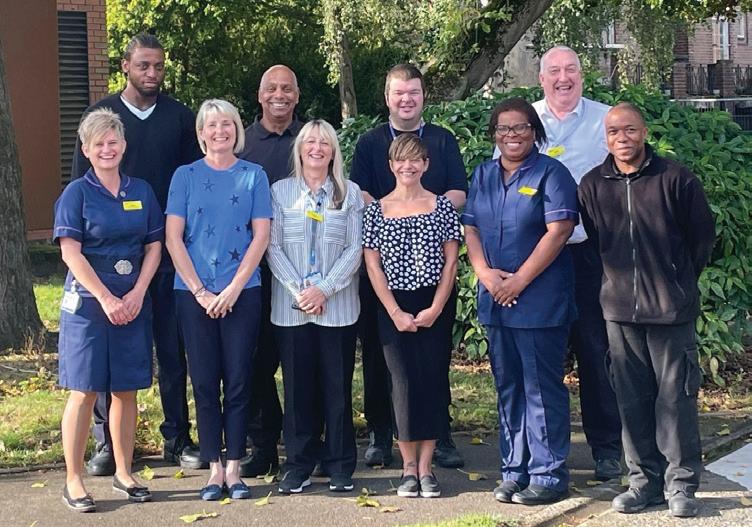
We have launched our People Plan which sets out how we will deliver on the People objective - to cultivate and sustain happy, productive, and engaged staff.
Our People Plan supports that strategic objective by focussing on improving staff satisfaction and experience to support a positive organisational culture to thrive. It is a direct response to the feedback given in the staff surveys.
The last pulse survey took place during July 2023, with over 1,400 colleagues taking the opportunity to feedback.
The staff engagement section of the survey looks at motivation, involvement and advocacy and together calculate an overall staff engagement score.
• Over half of the colleagues who took the survey look forward to going to work and are enthusiastic about their
job. This is the highest score we have had since Q2 of 22/23.
• 55 per cent of colleagues would recommend SWB as a place to work –this is also the highest score we have had since Q2 of 22/23.
I look forward to going to work.
Q2 I am enthusiastic about my job
Q3Time passes quickly when I am working
• The overall staff engagement score is 6.57, this is 0.01 higher than last quarter but 0.02 lower than this time last year.
Q4 There are frequent opportunities for me to show initiative in my role.
Q5 I am able to make suggestions to improve the work of my team/ department
06 I am able to make improvements happen in my area of work.
Q7 Care of patients/ service users is my organisation's top priority
Q8 I would recommend my organisation as a place to work.
Q9 If a friend or relative needed treatment I would be happy with the standard of care provided by this organisation
Chief Executive, Richard Beeken said: “These surveys give us really important information about what it is like to work at SWB. The table above shows we have improved in some areas, but we still have work to do.
“With the annual staff survey coming up this month, please do continue to engage with the feedback process, we need to know in order to make changes.”
The full results can be found on Connect.
8
Questions Score (Q1 23/24) Score (Q2 23/24) Improvement since Q1 in % Q1.
52% 53% 1%
65% 65% 0%
70% 71% 1%
66% 64% -2%
66% 66% 0%
56% 56% 0%
67% 69%
2%
52% 55% 3%
54% 54% 0%
Exciting new NHS England role for Rhea Conn
Rhea Conn, Critical Care Senior Sister and Clinical Sustainability Lead has been seconded to an exciting new sustainability role with NHS England.
Rhea has worked on many sustainability projects with various teams to contribute towards 'greening' the Trust by taking on projects where cost and carbon savings can be made. She is now embarking on a new venture that will help develop the work she has done with the Trust thus far.
The Chief Sustainability Officer’s Clinical Fellow Scheme offers clinicians with a passion for sustainability, a unique opportunity to hone their leadership skills by engaging directly with the most senior leaders in the NHS.
Rhea will be working at the centre of teams who are working to embed net zero carbon principles into the delivery of care across the system.
The scheme is sponsored by the Chief Sustainability Officer of NHS England and is aimed at aspiring future clinical leaders and is managed by the Faculty of Medical Leadership and Management.
It is a leadership development opportunity that immerses clinical fellows at the centre of national healthcare organisations, stepping out of clinical roles for 12 months to lead on key
Rhea Conn starts her new role in London projects that will fundamentally change the way that care is designed, developed, and delivered across the system.
Rhea will have the opportunity to meet regularly with senior members of the Greener NHS team, wider NHSE policy teams and stakeholders, clinical fellows will gain an unparalleled understanding of sustainability principles, a range of leadership and management, policy development, project management, research and analysis, communications, and collaboration skills.
CORPORATE AND GENERAL NEWS
Speaking to Heartbeat, Rhea said: “I’ll be working in the Chief Nurse’s Office at NHS England and will also be presenting at the professional forum to share my learnings.
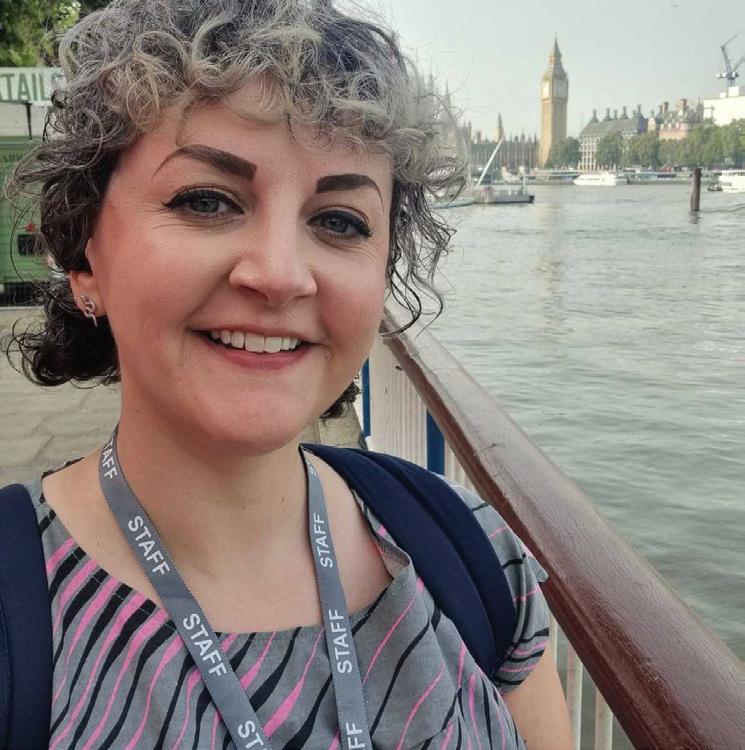
“This all came about from a nurse who was part of the first cohort, who contacted me on Twitter to encourage me to get involved. I am thrilled to be amongst the third cohort to be taking part in this fellowship.
“I am most looking forward to developing my leadership skills, understanding NHS operations from a national level and seeing another side of nursing. I am hoping through this role, we can give more power to clinicians to make sustainability changes. I will be using what I learn to support SWB. “I’m still working with Critical Care and encourage colleagues to connect with me via X (formerly twitter) @greenICUnurse and email if you have any questions about sustainability. I also encourage staff to join our ‘Green Impact’ programme to be involved in creating positive changes in your area of work.”
Shared reading - bringing people together and books to life
In a bid to bring people together to share thoughts and experiences and potentially aid wellbeing, the team in Library and Knowledge Services is introducing shared reading sessions for all colleagues and students across the Trust.
Working in partnership with international charitable organisation, The Reader, the sessions start in November 2023. Head of External Communications Vanya Rogers is currently on a six-week training course to become a trained facilitator and she told Heartbeat: “When Preeti Puligari Head of Library Services approached me to facilitate a shared reading session I said yes without actually realising what I was signing up to. As an avid reader (and writer) it was well within my comfort zone and my experience, and as a previous member of the Lichfield Poets I jumped at the chance to support our library services in a shared appreciation of literature.
“Now halfway through my course I am utterly hooked and eager to finish the course and become a ‘Reader Leader’.
In preparation and participation, I have rediscovered the value of discussion of some of our most well-known and best loved literary giants. Constructive debate and appreciation of the written word – a reminder of late night and early morning debates at university as I read English - has woken a longing to share this love with my colleagues and in doing so contribute in some way to continued wellbeing against a challenging day to day environment.”
Shared reading is a powerful group experience that brings literature to life. A group of two or more people – one of them a trained Reader Leader - meet on a regular basis, to read an extract from a book, a short story, or a poem aloud. As the text is being read, the group can stop and talk about what has been read. It’s that simple. The idea is to create a space where staff feel at ease.
Preeti Puligari shared, “We looked at different models that are currently used in public libraries such as book clubs or reading groups. We felt that the shared reading model will provide more
engagement with staff, explore different genres, reignite our love for reading, and sustain the interest with our staff and students”.
Reading aloud in real-time means everyone is involved in a shared, live experience. However, you do not have to read aloud if you do not want to. Group members are encouraged by the Reader Leader to respond personally, share feelings, thoughts and memories provoked by the reading.
Everyone experiences what’s read in their own way, but the shared language found in literature can help us to understand ourselves – and others –better. The sessions are open to all and free to attend.
2023 Shared Reading dates are:
• Wednesday 8th November 12.30 -1.30 pm SAN Medical Education Centre, Room 13
• Wednesday 6th December 12.30 -1.30 pm SAN Medical Education Centre, Room 13
9
Pioneering training programme sees six new recruits join YHP
CORPORATE AND GENERAL NEWS
Six new recruits have started work at a Your Health Partnership (YHP) thanks to a pioneering programme which aims to boost employment.
YHP hired the employees via the Sectorbased Work Academy Programme (SWAP) which saw them take part in a two-week training course.
Hyacinth Crossfield, aged 43, along with five others will work in admin roles at Lyndon Primary Care Centre, based at Sandwell Hospital, following the recruitment process.
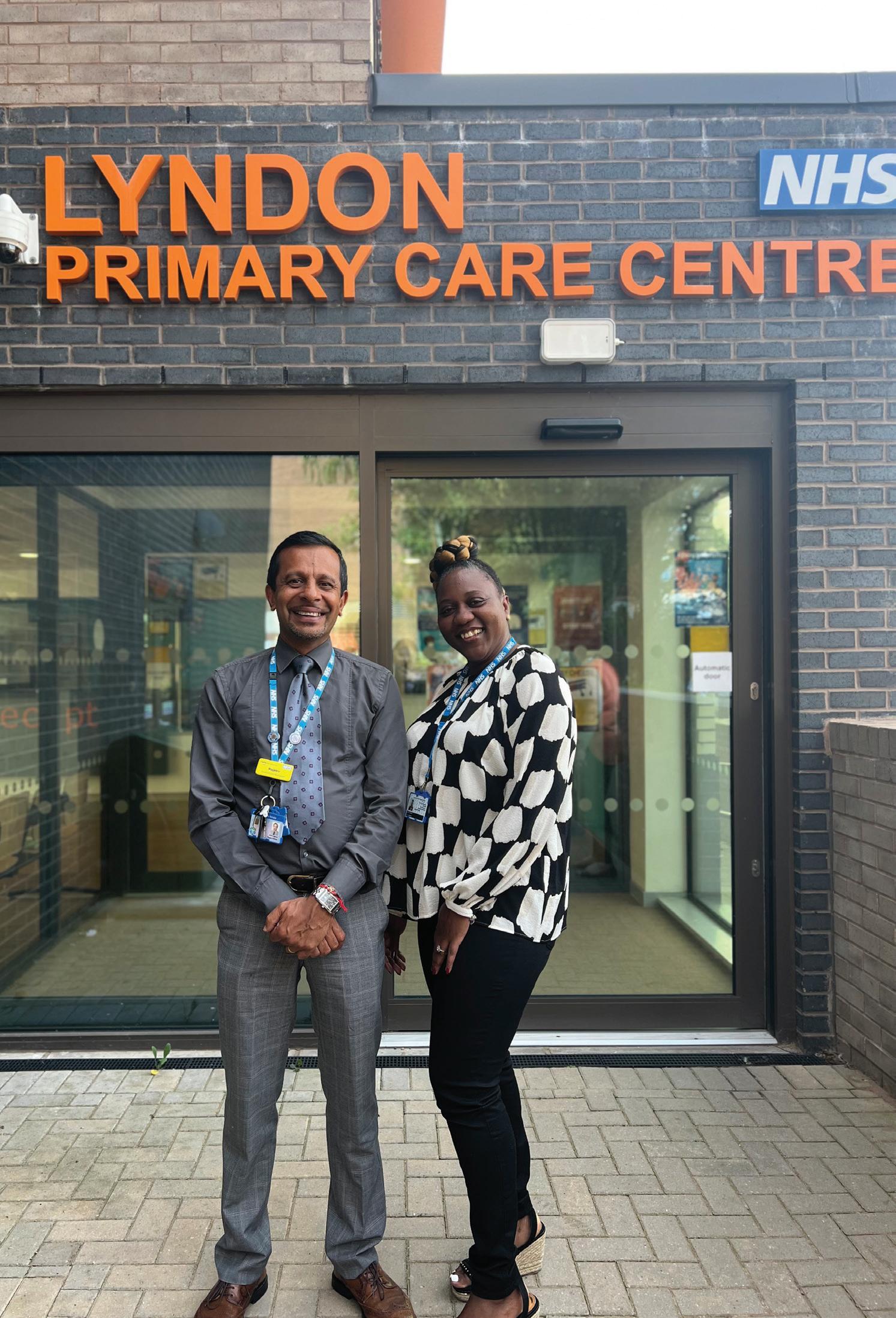
She said: “This is a fantastic programme which opened the window and gave me the opportunity to come into the NHS. I had been struggling for three years to find a job despite trying incredibly hard. I have various qualifications, but potential employers said I lacked experience.
“However, the SWAP programme changed everything. I was able to go into a workplace for two weeks and demonstrate I had the skill set and drive to do the job at YHP and this was recognised and taken on board during the interview process.
“SWAP works really well and I’m thrilled to be starting my new role at YHP.”
The Learning Works division is collaborating with the Department of Work and Pensions (DWP) and Sandwell College as part of the scheme. Candidates are signposted to the Trust via both the DWP and the college and there are a variety of roles available including admin jobs and ward service officers.
Rajeev Pathak, Operations Manager for Your Health Partnership, added: “This is a fantastic opportunity for enthusiastic individuals who are looking to get back into work or at the start of their career.
“The placement gives them the opportunity to show their initiative and skills as well as demonstrate their drive and passion for work.
“I was extremely impressed with the calibre of recruits who came to us via the SWAP programme, and I would recommend something like this to all employers. It opens up opportunities for so many talented people.”
Earlier this year West Midlands Mayor Andy Street visited the Learning Works to find out more about SWAP.
He said: “The SWAP programme helps get people into work through a training course that is short and sharp and helps people get into those jobs very quickly.
“It was brilliant to meet some of the people that are now going into work with help from the new scheme.”
Chairman, Sir David Nicholson said: “The learning works is based in the heart of our community and prides itself in how it offers a variety of opportunities to the people of Sandwell and West Birmingham by working with local employers.”
10
Hyacinth Crossfield with Rajeev Pathak
From now until we move into Midland Met, we will be sharing updates with you about the many people involved in the project and the role they each play.
The successful opening of Midland Metropolitan University Hospital relies on many people, teams and stakeholders. Once open, it will have a far-reaching impact – not only on those we care for but also on colleagues and our community in terms of regeneration, jobs, housing, charitable endeavours and so much more.
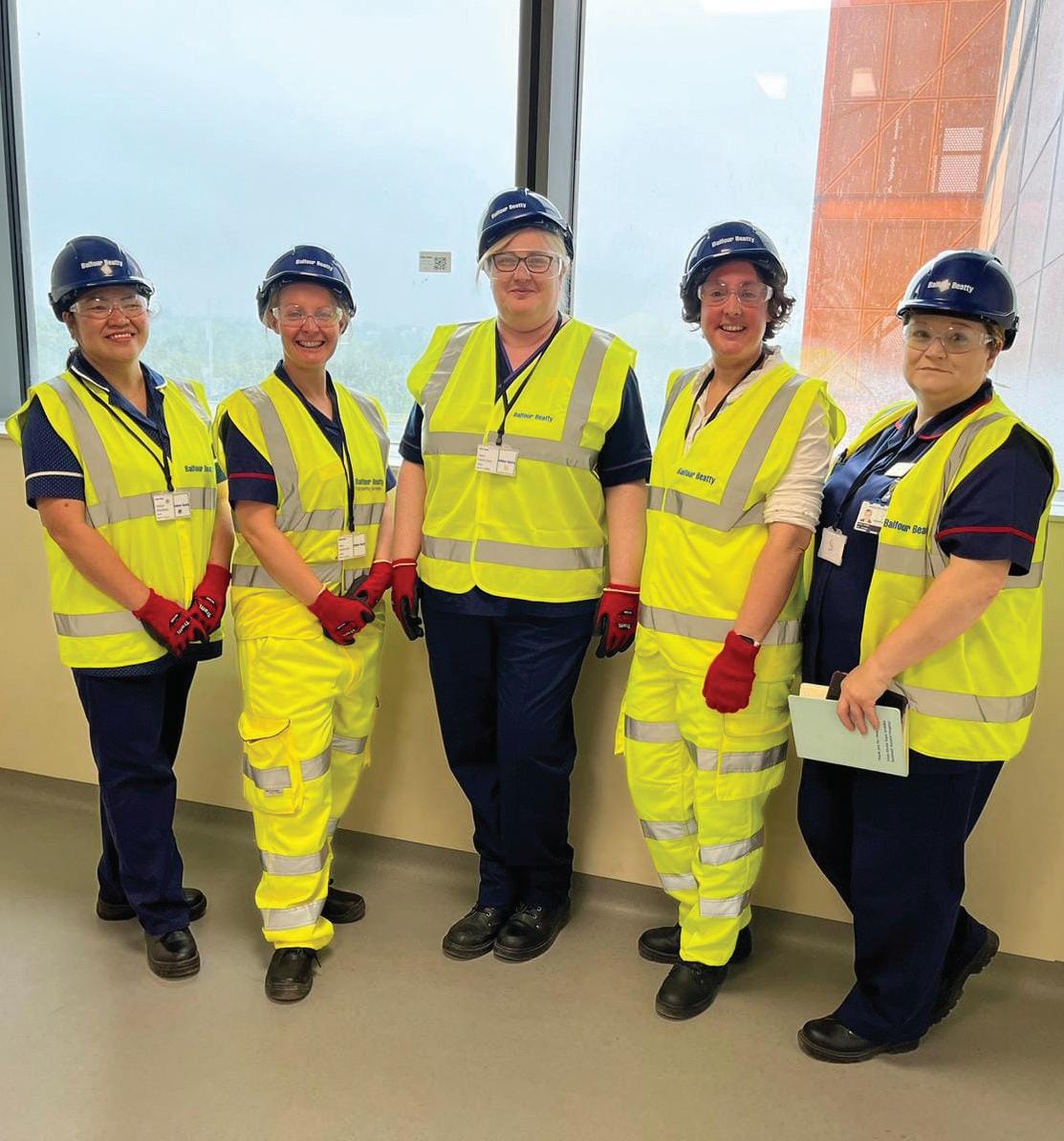

Getting us to Midland Met is a team effort. We all have a part to play in making it #morethanahospital!
My part in Midland Met
Justine Irish
How are you preparing for the opening of Midland Met in your team?
I’ve recently joined medicine and emergency care from primary care community and therapies and have been fortunate to see lots of prep has already started, from team leaders communicating regularly with colleagues to encouraging them to proactively engage with the vast amount of information shared across our staff channels. Plus, some colleagues have had the opportunity to visit Midland Met to understand how they fit in.
Teams who will be merging and working more closely together have started rotating to get to know each other before we move. Wards have nominated move champions who regularly share feedback about developments.
In what ways will our new hospital help to shape your role for the better?
Midland Met will bring together specialities, working with modern purpose-built facilities that reflect patient feedback about what they would like from a new healthcare facility. For example, Midland Met boasts single ensuite rooms and improved diagnostics, things we know are important to patients.
The biggest benefit that Midland Met will bring in your opinion is...
The benefits of opening Midland Met are vast and there are too many to name them all. Our state-of-the-art facility with improved diagnostics will promote a more efficient service and better patient experience.
How long have you been at SWB and what is your current role?
I have worked at SWB for 27 years and counting. I initially joined as a healthcare assistant, and now I’m a deputy group director of nursing within medicine.
What part does your role contribute to the Midland Met project?
My role is to lead our nursing teams towards preparedness, focusing on how the teams will work differently to facilitate a smooth transition to Midland Met.
I work closely with teams to ensure we stay on track of our operational readiness priorities, where possible, and escalate any concerns where required.
Regeneration of the Smethwick to Birmingham Corridor is going to be a game changer for the local area. I also love the prospect of the learning campus. It will help individuals to access training and development who otherwise may not have had the opportunity to do so.
Have you been on a site tour?
I was blown away on my first visit. The hundreds of staff working on site make it look easy; but you can see what a great job all the trades are doing.
The feel of the wards and rooms is fantastic. The space between beds may not seem a big deal, but nursing patients in small rooms isn’t ideal. When I saw a four-bedded bay, I was pleasantly surprised and look forward to colleagues being able to work in that environment. The planning that has gone into the layouts and navigation for visitors is genius.
??? NEWS NEWS
11
Justine Irish with members of her team enjoying a tour of Midland Met
Earlier this year, Patricia Hunt, Midland Met Volunteer Recruitment Manager, set her sights on recruiting 80 volunteers to support our new hospital opening in 2024.
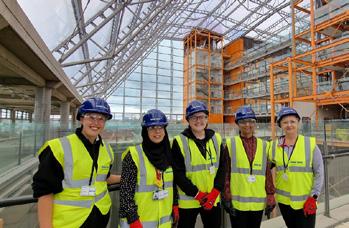
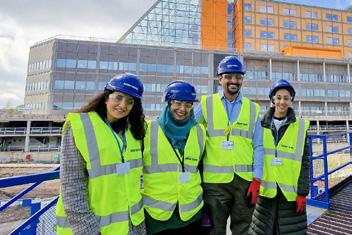
The Midland Metropolitan University Hospital will be a game changer for SWB – our patients, people and our population. It will see us deliver acute care in a modern healthcare setting, and it promises to be so much more than a hospital.
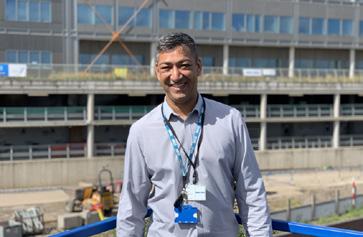

With all that to look forward to, we have a need to recruit kind and compassionate volunteers to help us make a difference for our patients, colleagues and visitors.
In September, Patricia welcomed two cohorts of potential volunteers to Midland Met. With guests joining the sessions from across the organisation, it gave the prospective volunteers a glimpse of what life at Midland Met will be like and how we would like them to work with us.
The sessions got interactive with a chance to put their creative skills to the test and even hear from our chaplaincy and bereavement teams with Rachel Barlow, Managing Director, stopping by to speak with the volunteers too.
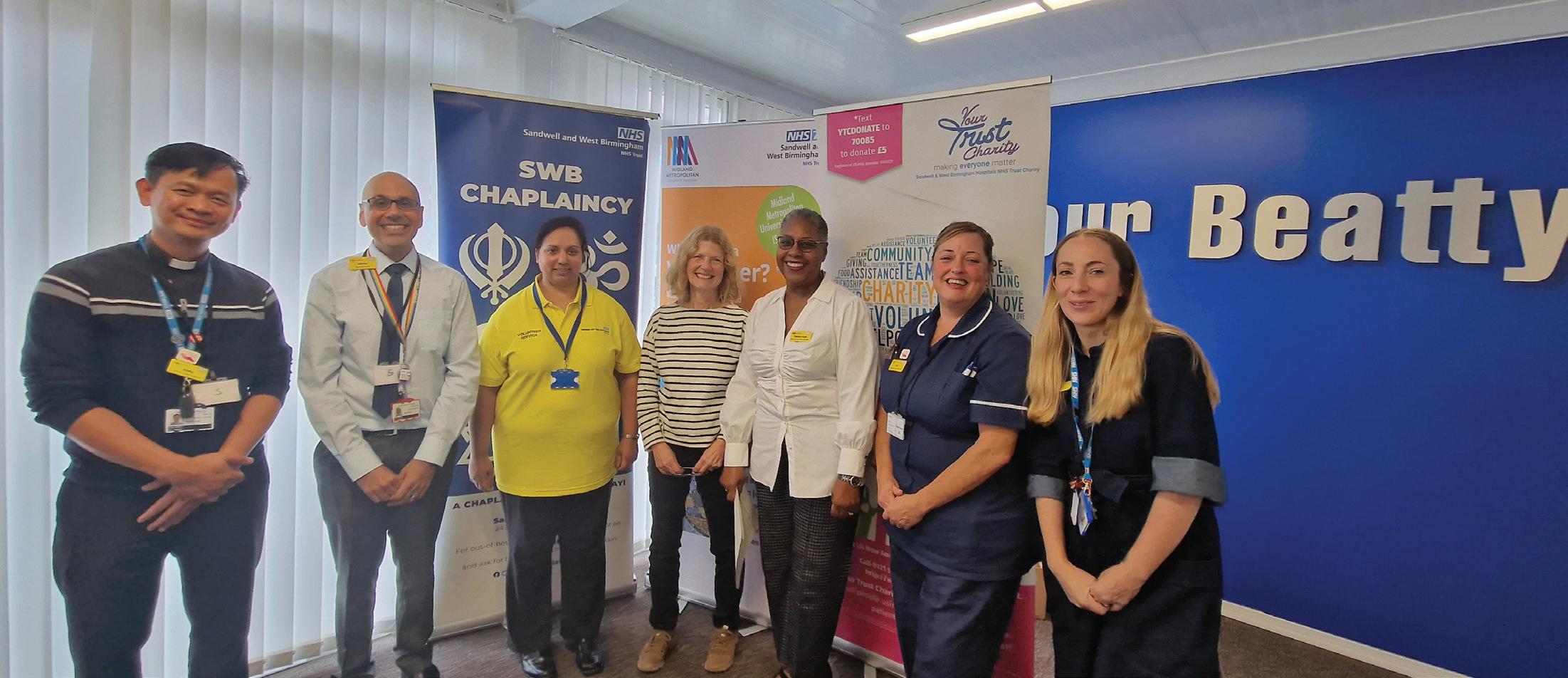
Patricia said: “Thank you to everyone who gave up their time to help me host these sessions and those who helped me to pull everything together. It was a good day, and the diversity of those in attendance was great
Volunteers set to make a difference at Midland Met
- very reflective of the communities we serve. There was a definite buzz around the room, especially during the interactive sessions.”
Johnny Shah, Head of Your Trust Charity, echoed these sentiments. He said: “Pat did a great job pulling off these sessions. She works one day a week, and in that time, she has managed to bring together a great group of people who understand our vision and want to help us to deliver it.
“We are looking for volunteers who can act as navigators and support our arts programme, wellbeing, catering and other roles. This is a great opportunity to get involved in Midland Met and contribute to its success. The hospital is equipped with modern healthcare facilities, the regional sickle cell and thalaessemia centre and a beautiful Winter Garden on level 5. These are just a few of the amazing things that Midland Met has to offer.”

??? NEWS NEWS
12
Patricia Hunt with some of the speakers at the first volunteer engagement session
Join our Midland
Facebook group Keep up to date with what’s going on at Midland Met on our exclusive staff only Facebook group. We regularly share photos and videos from the new site, giving you an inside look at how things are shaping up. You’ll have access to exclusive updates about the new hospital, including sneak peeks at what’s to come. Scan the QR code below to join or go to https://bit.ly/MMUHFB
Met
MP7251
Sandwell and West Birmingham NHS Trust
Having the ability to adapt and embrace cutting-edge technology is paramount to providing the best care possible, and one of the areas this is most important in is our neonatal unit, where we care for the youngest and most vulnerable babies. As we gear up for the big move to the Midland Metropolitan Hospital in 2024, the informatics team has been hard at work ensuring that our neonatal team has the right tech tools for their job, this month replacing aging computer carts and ushering in a new era of mobility, flexibility, and efficiency.
Sharing the news of the new carts being deployed, Imran Ravat, Informatics Project Manager, said: “The decision to upgrade the computer carts stemmed from the fact that the existing carts were showing their age. With warranties expiring and issues arising, it was clear that these carts were no longer fit for purpose. This presented the perfect opportunity to work with the neonatal team to revamp their equipment and ensure they were all set for the move to Midland Metropolitan Hospital.
“The previous computer carts, though reliable in their time, had their share of limitations.
Neonatal Unit take delivery of high-tech computer carts
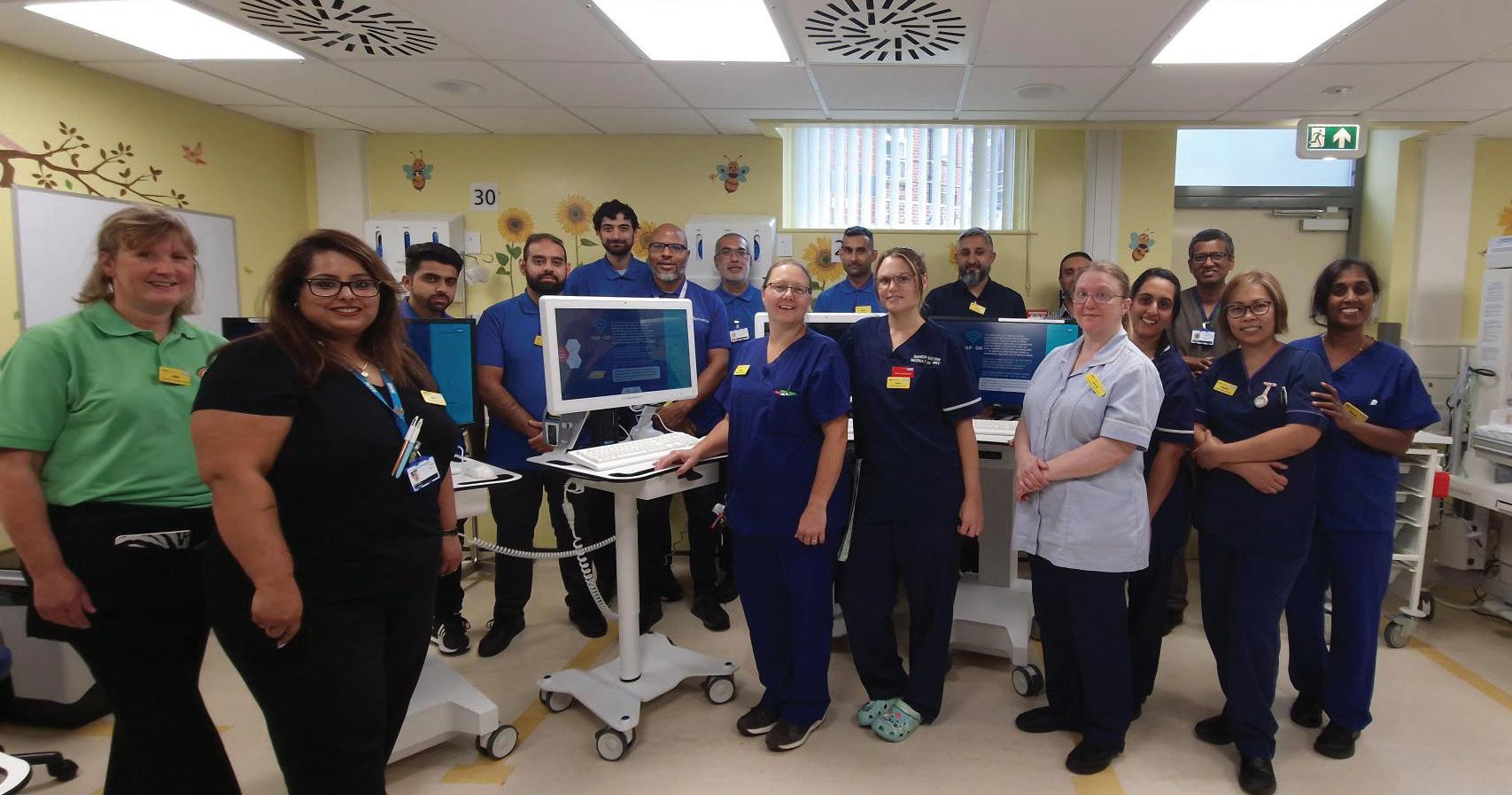
They depended heavily on mains power to function, which meant that once disconnected, they had a mere 15 minutes of operational time before they powered down. This posed a significant inconvenience for a mobile cart, particularly in a critical care setting like neonatal.”
Enter the new carts - these state-of-the-art wonders on wheels powered by rechargeable batteries and offering uninterrupted functionality throughout the day. What's more, they can still be plugged into mains power if needed and boast hot-swappable batteries (which can be changed without powering down the computer) that can be easily charged via a docking station. It's a game-changer for the neonatal team, providing them with the reliability and flexibility they need to deliver safe and effective care.
One of the key ingredients in the success of this project has been the close collaboration between informatics and neonatal team.
Jennifer Cadwallader-Hunt, Advanced Neonatal Nurse Practitioner, played a pivotal role in defining the requirements for the new carts. She said, “This partnership began with a simple Teams call with the informatics team to discuss the carts that needed replacing and to
share a little more information on our needs.
“We even had the opportunity to visit the informatics team at Sandwell to view and demo the new carts and provide some feedback to ensure they perfectly met our team's requirements.
“So, how have our neonatal staff responded to this upgrade? It’s been a resounding success and the feedback is overwhelmingly positive. The team is delighted with the new carts, which they find to be a vast improvement over their previous. The enhanced mobility, extended battery life, and flexibility have allayed any concerns and instilled confidence as we prepare for the move to the Midland Met.
In total, neonatal were supplied with 28 new computer carts, 10 were requested with smaller screens and built-in PCs, while the remaining 18 boast larger screens, aligning perfectly with the specific requirements of the neonatal unit.
This collaborative effort between the informatics and neonatal teams serves as a shining example of how forward-thinking, technology-driven solutions can enhance patient care.

??? NEWS NEWS
from Neonatal and IT with the new carts 13
Colleagues
Guide to accessing services
As winter draws nearer, we’ve put together a guide to available We have a number of services that provide avenues of care that can be accessed
The Care Navigation Centre (CNC) is one of the first points of call for patients, The caller will be directed to the most appropriate one for their needs. It’s open seven
The range of services are below:
iCares (Integrated Care Service): 0121 507 2664, seven days a week, between 8am and 8pm
iCares is a service and an approach to managing adults with long term conditions irrespective of their diagnosis, location or age. It covers a range of pathways (admission avoidance, rehabilitation, reablement, elderly frail, head injury, stroke, falls and bone health, progressive neurology, care management, therapy and case management into end of life care, wheelchair service, readmissions avoidance). It includes a range of staff including nurses and therapists providing specialist community interventions which will avoid unnecessary admissions to hospital, help maintain health and wellbeing, and improve independence and function.
Care Homes Team: 0121 507 2664, seven days a week, between 8am and 8pm
Care Homes Team is a multi -professional team, consisting of nurses, physiotherapists, occupational therapists, speech therapists and support workers. The main focus is on long term condition management, reablement and proactive interventions to support admission avoidance in care homes and provide support to care homes to keep their residents at home.
Connected Palliative Care (CPC): 0121 507 2664, seven days a week, between 8am and 8pm
The service offers advice and support to primary care (GPs), care homes and your local hospital, so that healthcare professionals are skilled and able to help patients cope with their life-limiting illness. The team also signpost patients, carers and professionals to services that provide care, advice and equipment. This includes sitting services, befriending, domestic support and welfare rights advice. There is an out of hours service between 8pm and 8am to provide an urgent response for patients in crisis.
District Nursing Service: 0121 507 2664, seven days a week, between 8am and 8pm
The Sandwell District Nursing team provide care to housebound patients who are unable to access services via normal routes. They offer a wide range of nursing activities, delivered by highly skilled nurses to patients. The Sandwell District Nursing Service is comprised of seven teams spread across the borough and are able to offer: treatment of wounds; leg ulcer care; wound Care; IV therapy; blood tests; end of life and palliative care; injections; continence care/assessment and promotion of self-care. The Sandwell District Nursing team are part of the wider iCares service and work with them to provide the necessary nursing care.
Community Continence Service: 0121 507 2664, seven days a week, between 8am and 6pm excluding BankHolidays. For 24/7 home delivery, please leave a message outside normal working hours
The Community Continence Service provides professional advice, support and education to Sandwell patients about promoting continence (controlling the bladder and bowels) and managing incontinence. Individuals can self-refer if they wish, however they must be over the age of 18 and registered with a Sandwell GP.
Foot Health: 0121 507 2664 between 8am and 6pm Monday to Friday, excluding Bank Holidays
The service cares for a wide range of foot and lower limb problems amongst the population of Sandwell and West Birmingham community. The team provides a number of specialist clinics tailored to each patients need including: nail surgery, neurological foot service, biomechanics, diabetic foot care, rheumatology and podopaediatric (a specialist area of podiatry that specifically focuses on the developing lower limb in children) clinics. Any patients with an active diabetic foot ulceration should be referred to both the Foot Health team and the Diabetic Foot Clinic.
Musculoskeletal (MSK) Physiotherapy: 0121 507 2664 between 8am and 6pm Monday to Friday excluding Bank Holidays
The Community Musculoskeletal Physiotherapy Service helps patients with an MSK condition which can be as a result of by injury, illness or disability through movement, exercise, manual therapy, education and advice to support patients manage pain and improve function in addition to preventing re-injury and promoting health and wellbeing.
14
services as winter approaches
routes for treatment – whether that’s urgent or non-urgent care. accessed directly by patients, or via referral from a healthcare professional.
patients, GPs and healthcare professionals and offers a range of services. seven days a week between 8am and 8pm and can be accessed by calling 0121 507 2664
Community Respiratory: 0121 507 2664, 8am and 6pm Monday to Friday. Sat/Sun Bank Holidays 8.30am and 4.30pm
The Community Respiratory Service treats Sandwell residents with breathing problems. The service provides a holistic approach to those living with Chronic Obstructive Pulmonary Disease (COPD), asthma, bronchiectasis and interstitial lung disease (ILD). Patients are seen in community-based clinics and also in their own homes for those who are unable to leave their residence.
Community Heart Failure Service: 0121 507 2664, between 8am and 6pm Monday to Friday and Sat/Sun/Bank Holidays between 8am and 4pm
Both the acute and community service assess patients and help them with managing their medications, lifestyle support, psychological support, blood tests, and electro-cardiograms (recording electrical activity in the heart). The team provides care for patients with a combination of home visits and telephone contact. Community clinics are also run where patients are seen in a general practice or health centre by a specialist nurse.
Wheelchair Service: 0121 507 2664 between 8am and 6pm, Monday to Friday, excluding Bank holidays
Provide mobility and postural assessment and solutions for people with a Sandwell GP requiring a wheelchair for full time use inside their own home. Support both adults and children with a Sandwell GP.
The following services require referral:
Urgent Community Response Team (UCR): 0121 507 2664, seven days a week, between 8am and 8pm
The service responds to crisis referrals for falls, decompensation of frailty, reduced function, deconditioning, reduced mobility, palliative end of life crisis, urgent equipment provision, confusion, delirium, urgent catheter care, urgent diabetes and paid carer breakdown.
Single Point of Access (SPA): 0121 507 3301, seven days a week, between 8am and 8pm
Aimed at helping healthcare professionals arrange the correct care for both urgent and emergency referrals but DOES NOT replace routine outpatients’ referral. The team help to prevent avoidable admissions and supports patients in the community with longstanding condition or acute presentation. Following the call, the patient will then sit under the care of the SPA team who will ensure that the patient is seen by the appropriate team/speciality to meet their needs.
Virtual Wards (Adult/Paediatrics/Palliative Care): 0121 507 2664, seven days a week, between 8am and 8pm
Virtual wards, which include Hospital at Home, are a safe and efficient alternative to NHS bedded care. Virtual wards support patients, who would otherwise be in hospital, to receive the acute care and treatment they need in their own home. We have four adult Virtual Wards which are for respiratory infections, frailty, cardiology and EPICENTRE (Emergency Point of Care Testing and Treatment without Transfer To Hospital). We also have a paediatric Virtual Wards team.
15
Newly refurbished MRI centre opens at Sandwell Hospital
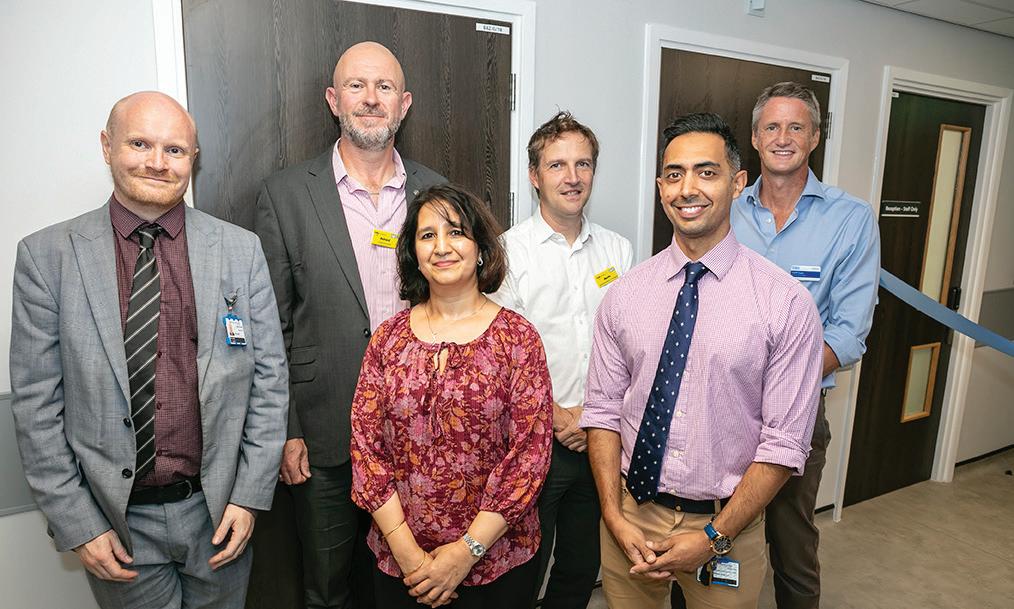
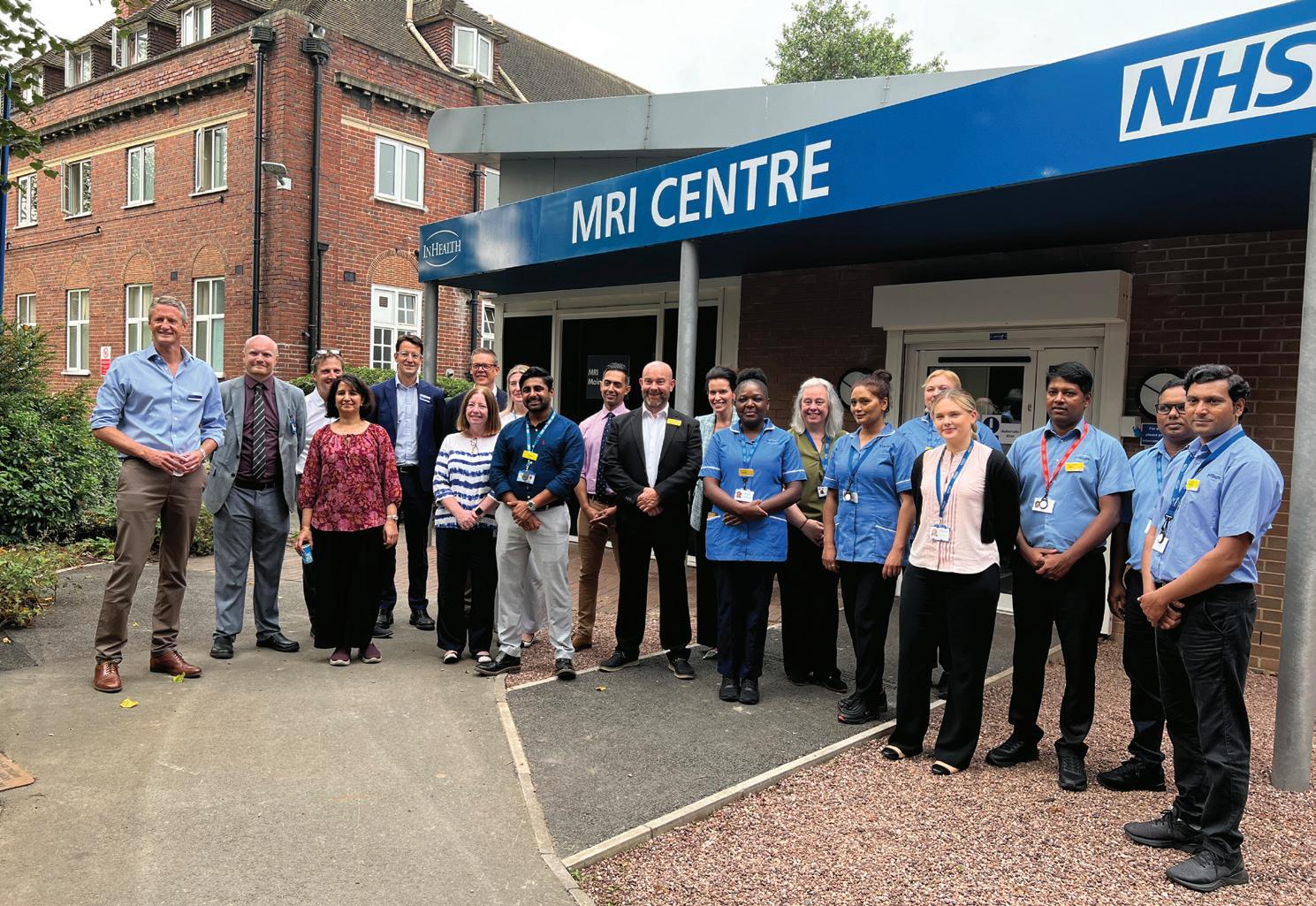
IMAGING
More than 800 more patients will be seen each month following the opening of the newly refurbished MRI centre at Sandwell Hospital. Over the last nine months, teams from the Trust and InHealth have been working in partnership to upgrade the centre, with a full refurbishment throughout and the addition of new, state-of-the-art equipment.
Two Siemens 1.5T MRI scanners bring the latest in MRI technology, providing faster scanning techniques, high specification lighting and a feature ceiling panel – helping patients to feel more relaxed during their appointment.
Darren Smith, Group Director of Operations for Imaging said: “Before the refurbishment, the MRI centre at Sandwell scanned approximately 600 patients each month, now we will be able to see 800 more patients, which will help to drastically reduce our waiting time for appointments and help speed up the patient journey for those awaiting diagnostics.”
Reducing their impact on the environment is a continuous priority for InHealth and this has been at the forefront of the refurbishment. Chief Executive at InHealth, Geoff Searle explained more: “Our Siemens Sola scanners use energy-saving green technology, reducing out energy consumption by up to 40 per cent and advancing out ongoing commitments towards offering a sustainable healthcare service.”
The official opening event saw a big turnout from both SWB and InHealth, with Geoff joined Trust CEO, Richard Beeken to do the honours and cut the ceremonial ribbon, guests were then treated to a guided tour of the new facility
Richard said: “The transformation is fantastic – my thanks and congratulations goes to all those involved in make this project a huge success. “The fact that we can now offer 800 additional appointments will make a massive difference to our patients.”
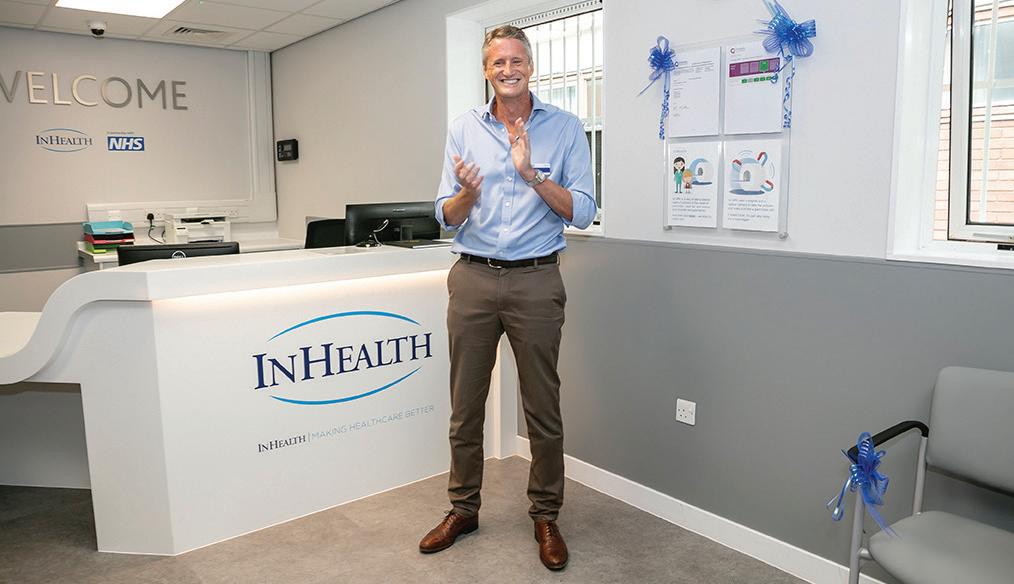
16
Colleagues celebrated the opening of the new MRI centre
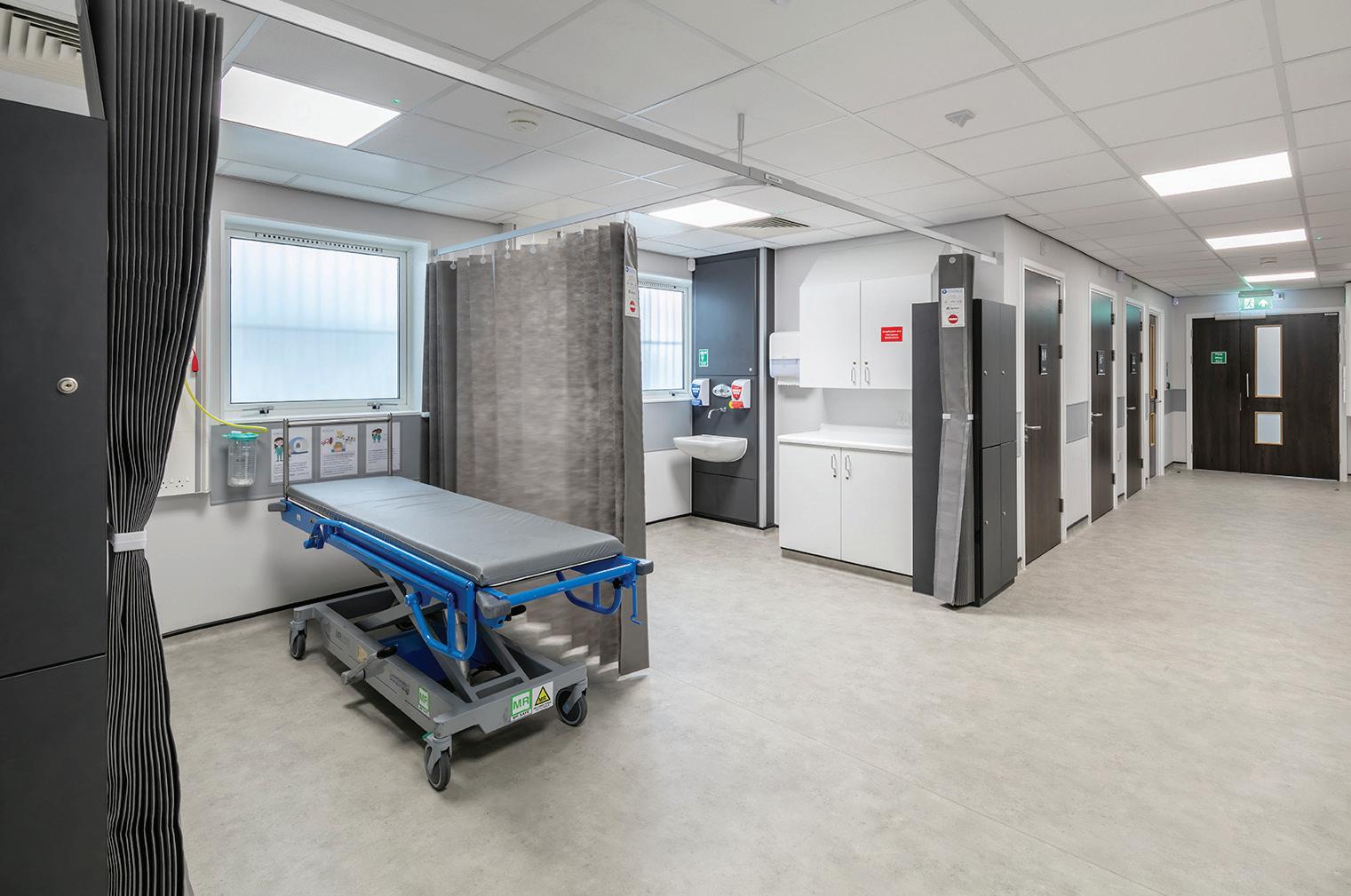
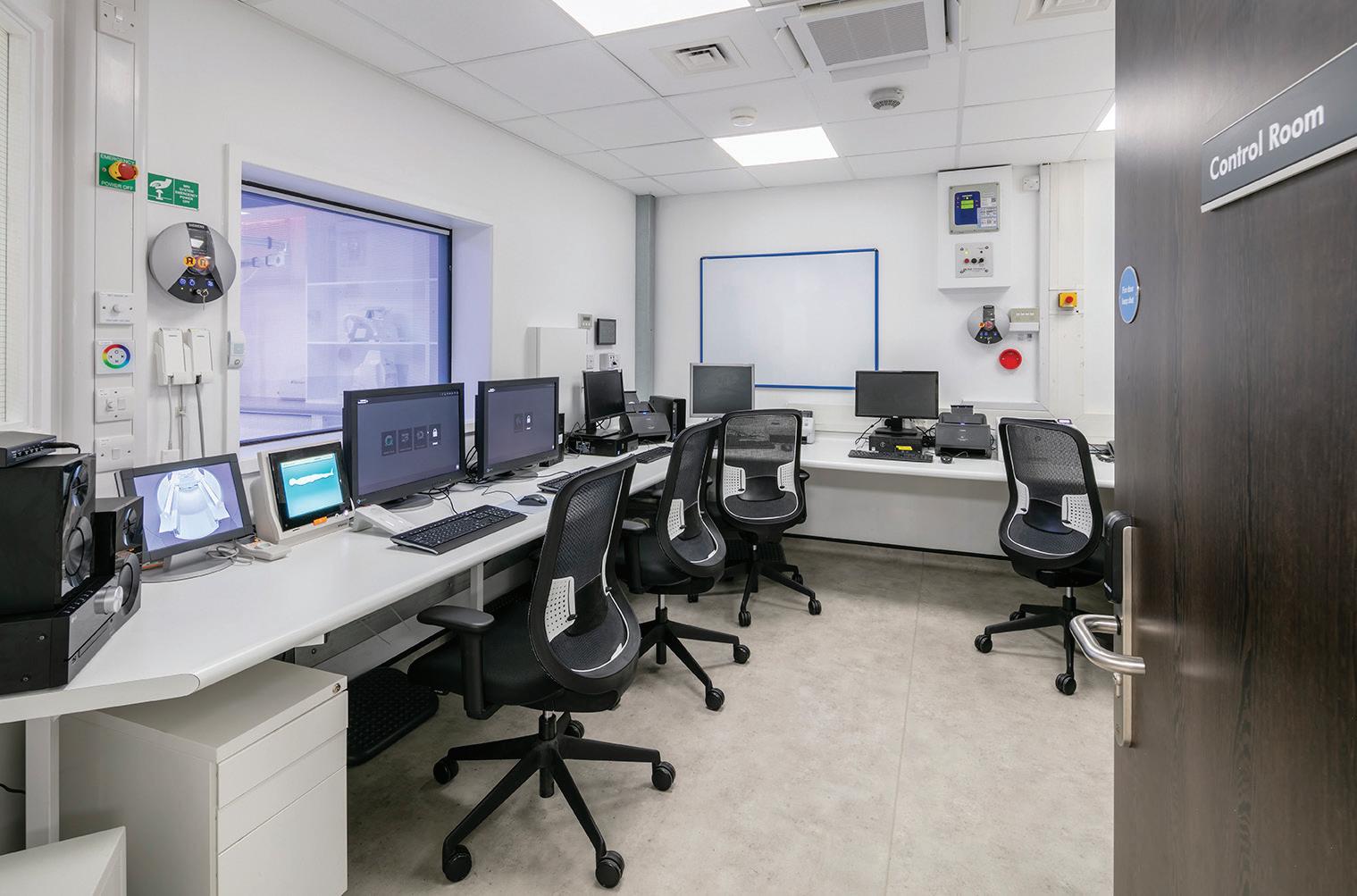
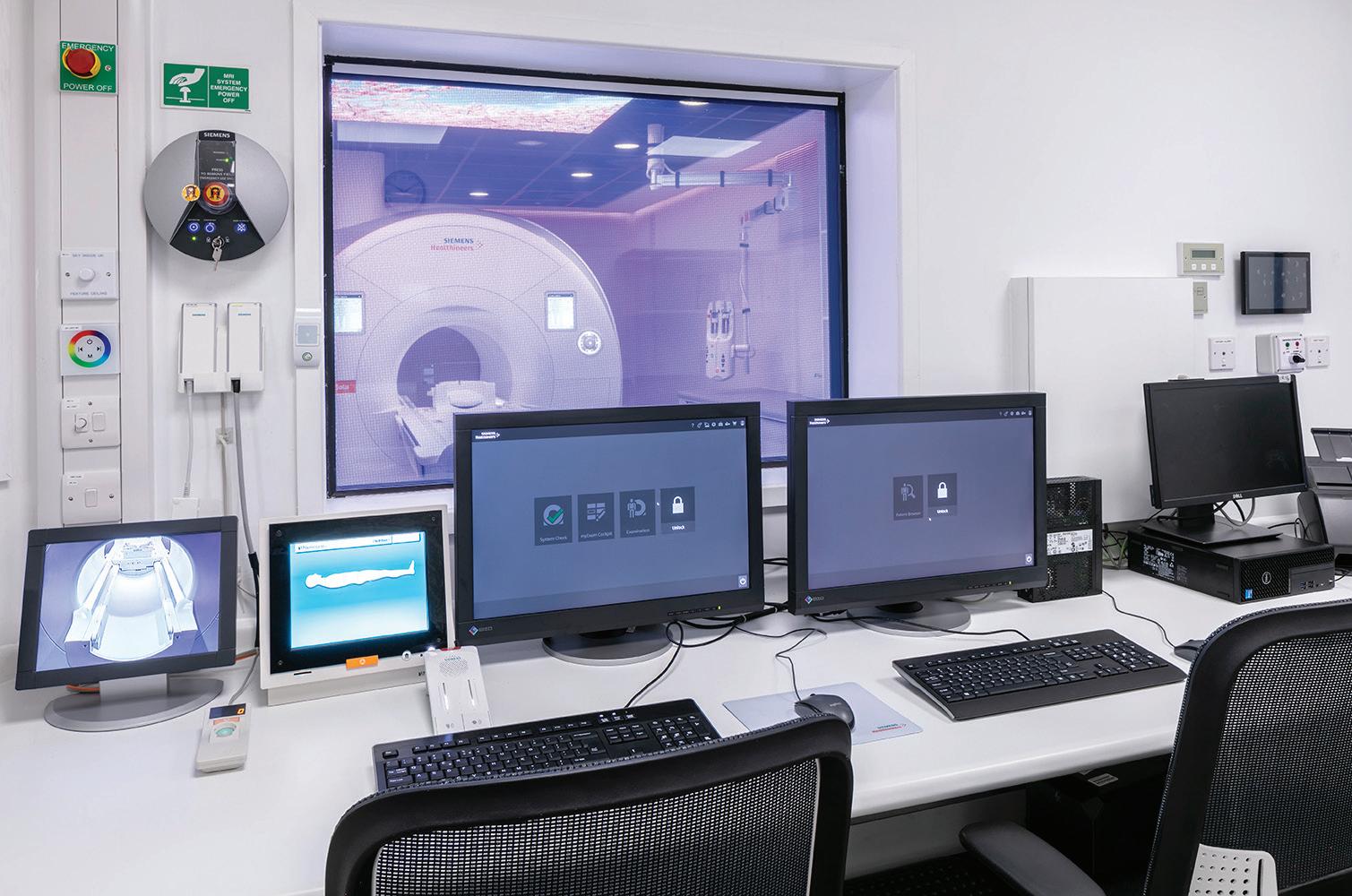
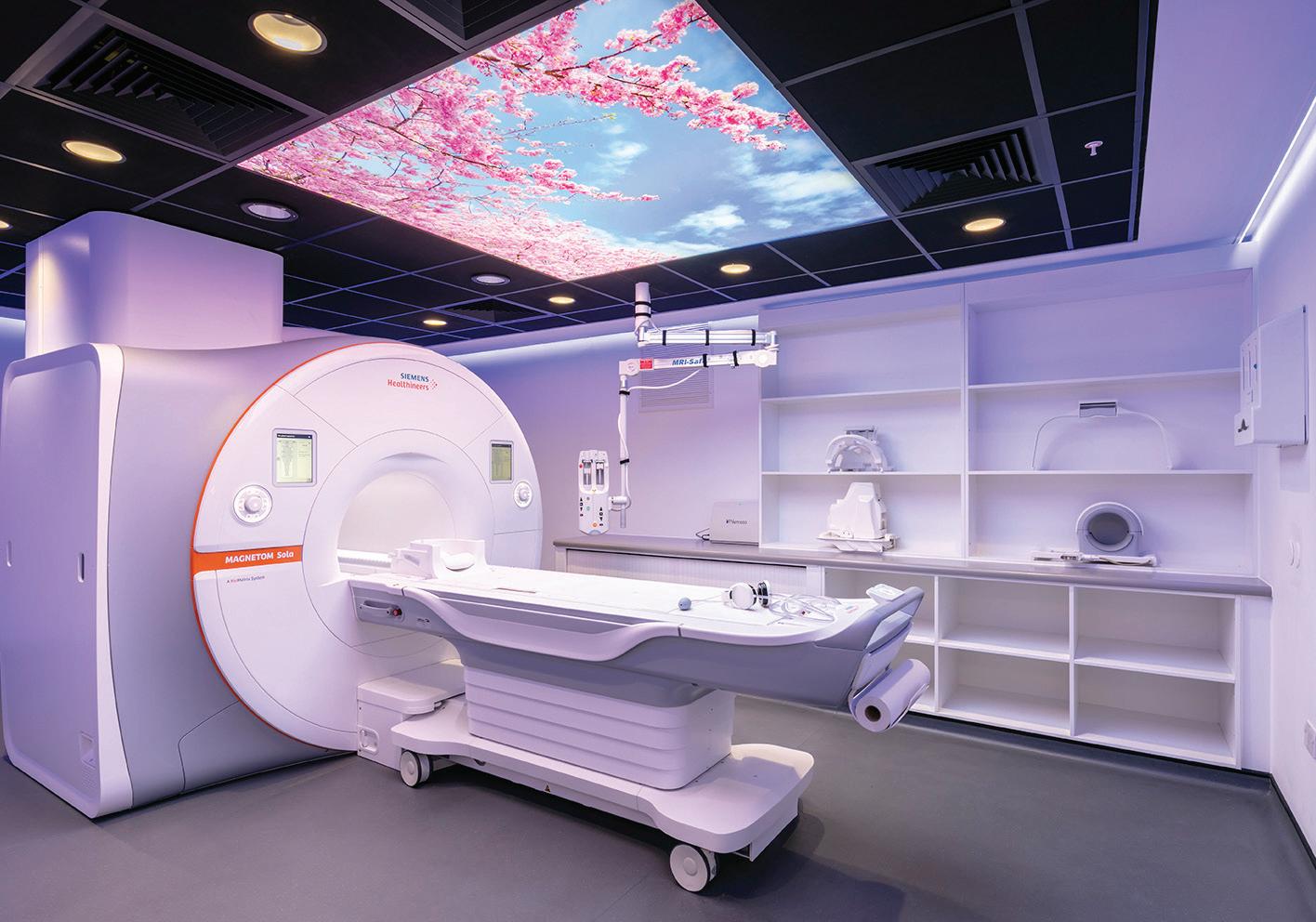
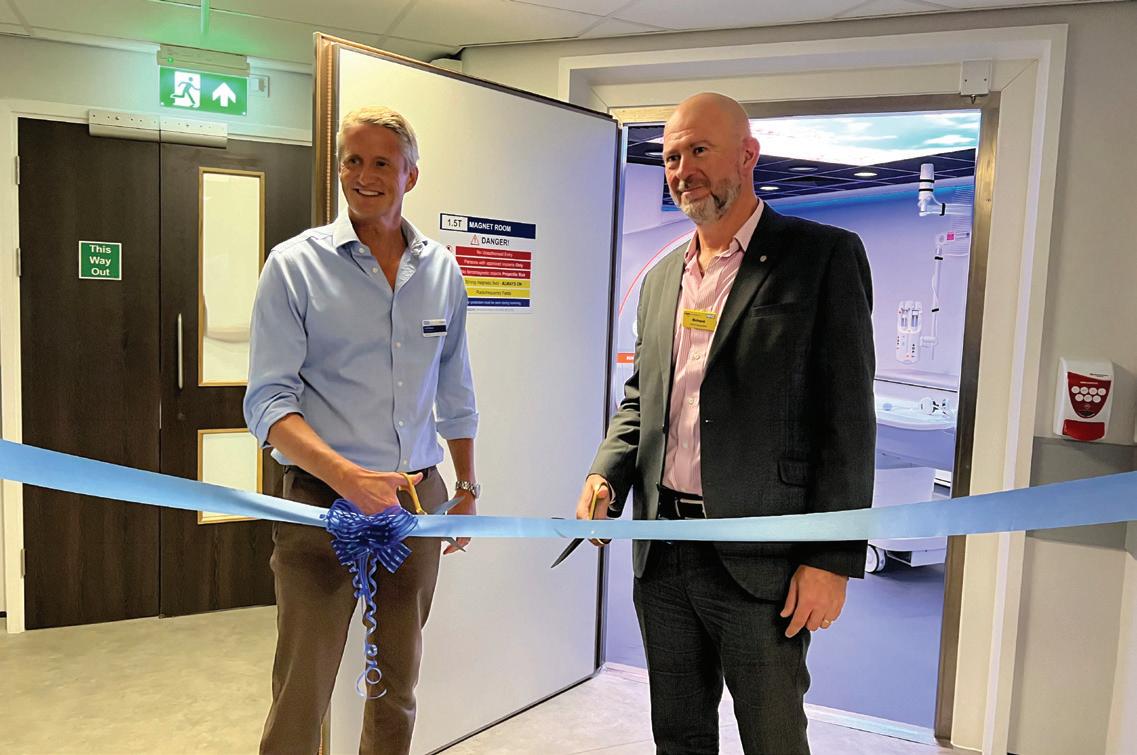
17
SWB's new MRI centre boasts state-of-the-art facilities
Get yourself protected: Flu and COVID-19 vaccinations now available
Every year, rates of respiratory conditions such as flu increase across the winter season, putting people across our communities at risk. To protect yourself, your loved ones and our patients, we offer vaccinations over a number of months, offering all colleagues the opportunity to stay safe and protected this winter.
This year, we are offering flu and COVID-19 vaccinations across multiple sites, beginning with alternate weeks (including weekends) at Sandwell General Hospital and Birmingham City Hospital.

Vaccinations are drop-in only; you do not need to book. You will be able to have one or both vaccines, administered in two separate injections, on the same day.
The locations are as follows:
Sandwell: Berridge Room, Courtyard Garden and Sandwell Occupational Health Department (8.30am – 4pm)
Every other week from 2 October
• City: 1st floor corridor (old outpatients), above Arches (8.30am – 4pm) Every other week from 9 October
This year, we have a dedicated line to answer any queries. Call 07977687486 to speak directly to a member of the vaccination team.
October is Breast Cancer Awareness Month








































18
We all know someone touched by breast cancer. To mark Breast Cancer Awareness Month, the Breast Unit are holding an event on 24 October with crafts, cakes and other items for sale and a raffle. Come along to raise awareness and funds! 24 October 2023, 10:00-15:00 Breast Unit, ground floor, Birmingham Treatment Centre CORPORATE AND GENERAL NEWS
Light therapy blanket helps to reduce over 75 bed days in hospital
WOMENS AND CHILD HEALTH
their own home. Initially, for the first 24 hours the newborn will be inside the light therapy blanket until their bloods are taken. Throughout the treatment, parents can feed and give comfort to their baby.
The paediatric virtual ward team provide home visits and on-call support to new parents, visiting once a day to take the babies blood, offer support with feeding, discuss safe sleeping and check parents are happy with using the BiliceCocoon. Once the results come back from the blood test, if the bilirubin levels have reduced below the treatment line the team then contact the family to advise whether the baby needs to remain within the light therapy blanket.
Mandeep Kaur and Jagjeet Singh recently became parents to Mehar who was suffering from jaundice. Mandeep said: “As a family, this treatment has saved us from travelling via public transport with a newborn and given us the opportunity to be at home with our baby whilst treating her for jaundice. The virtual wards team are one call away and have provided us with support throughout the treatment.”
Lorraine Paynter, Paediatric Virtual Ward Nurse said: “The fact that parents can carry out this treatment at home is much more beneficial to the child and family. It means they can be in the comfort of their own home, and this can speed up recovery. We’re delighted with Mehar’s progress and now the family can carry on with their lives without worrying about her health.”
Since launching the treatment on 24 June, the light therapy treatment has helped to support 33 jaundiced babies across the local area and saved 76 bed days in the hospital.
Baby Mehar receiving light therapy treatment at home
A new light therapy treatment for newborn babies with jaundice is reducing hospital stays and enabling families to provide necessary care whilst remaining at home.
The paediatric virtual wards team have recently introduced a BiliceCocoon, a light therapy blanket, to help reduce jaundice levels in newborn babies.
Jaundice can affect nine out of 10 babies. The signs include, yellowing of the skin, mucous membranes, and whites of their eyes due to an immature liver. At hospital, jaundice is treated by putting a baby inside a cot under the light, meaning when the baby needs to be fed or comforted, they must be taken out of the phototherapy light.
The new light therapy blanket provides an alternative treatment for newborns within
Sophie Harris, Clinical Nurse Specialist within Paediatric Virtual Ward team said: “Since the introduction of the BiliceCocoons which were purchased through funding provided by NHS England, the team have been able to support with early discharges and avoid hospital admissions. The aim for the future is to further reduce hospital admissions by supporting our community midwives and to continue to be able to treat more babies at home with jaundice.”
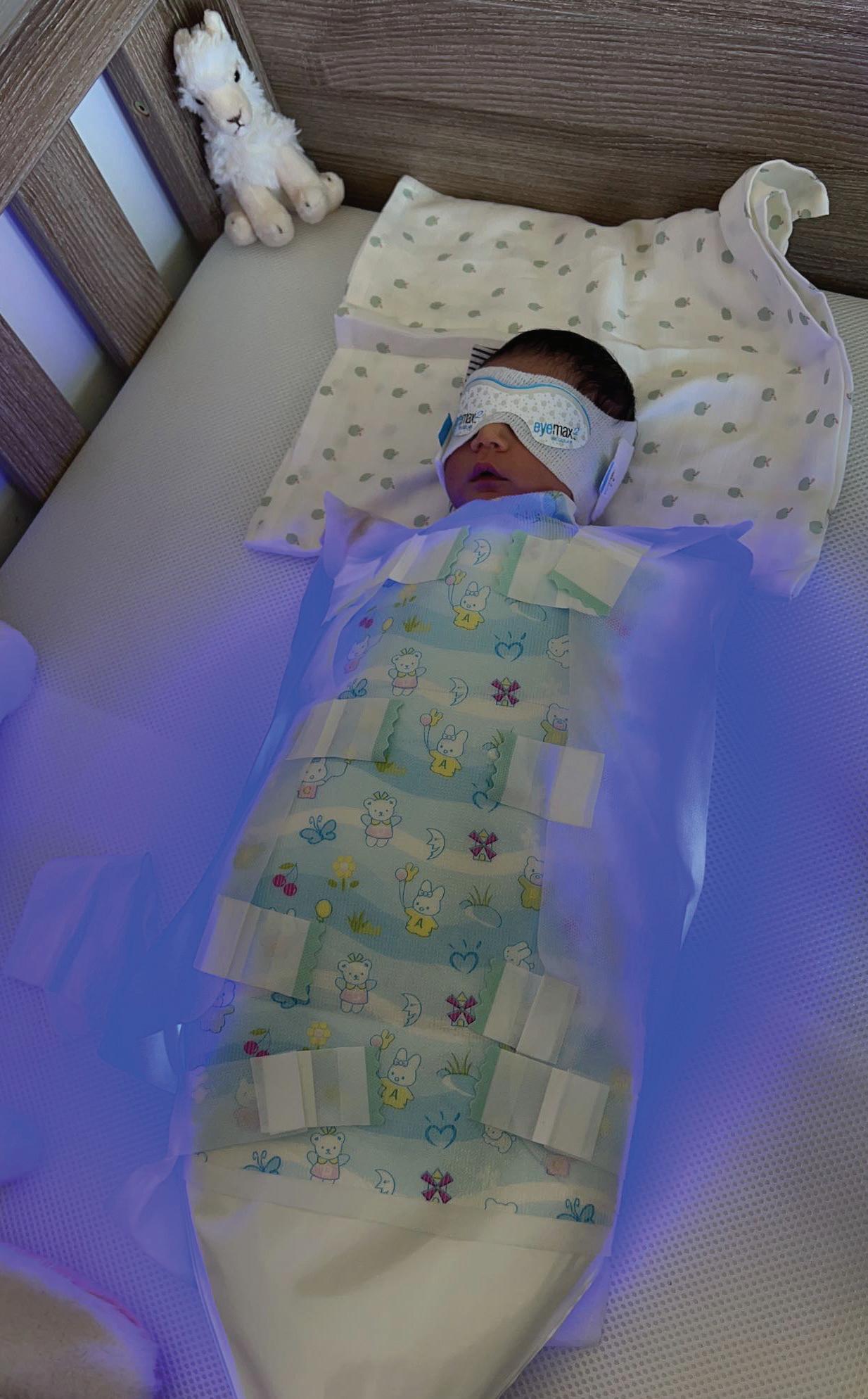
19
Increasing colleague awareness of sickle cell disease management
MEDICINE AND EMERGENCY CARE
September was Sickle Cell
Awareness month and the team at the Trust continue to develop resources, training and material for colleagues and the public to understand more about the disease.
The Sickle Cell and Thalassaemia unit (known as SCaT) is a day-case treatment centre based at City Hospital, providing care for patients with both conditions. Some appointments are booked, but it’s largely a walk-in service.
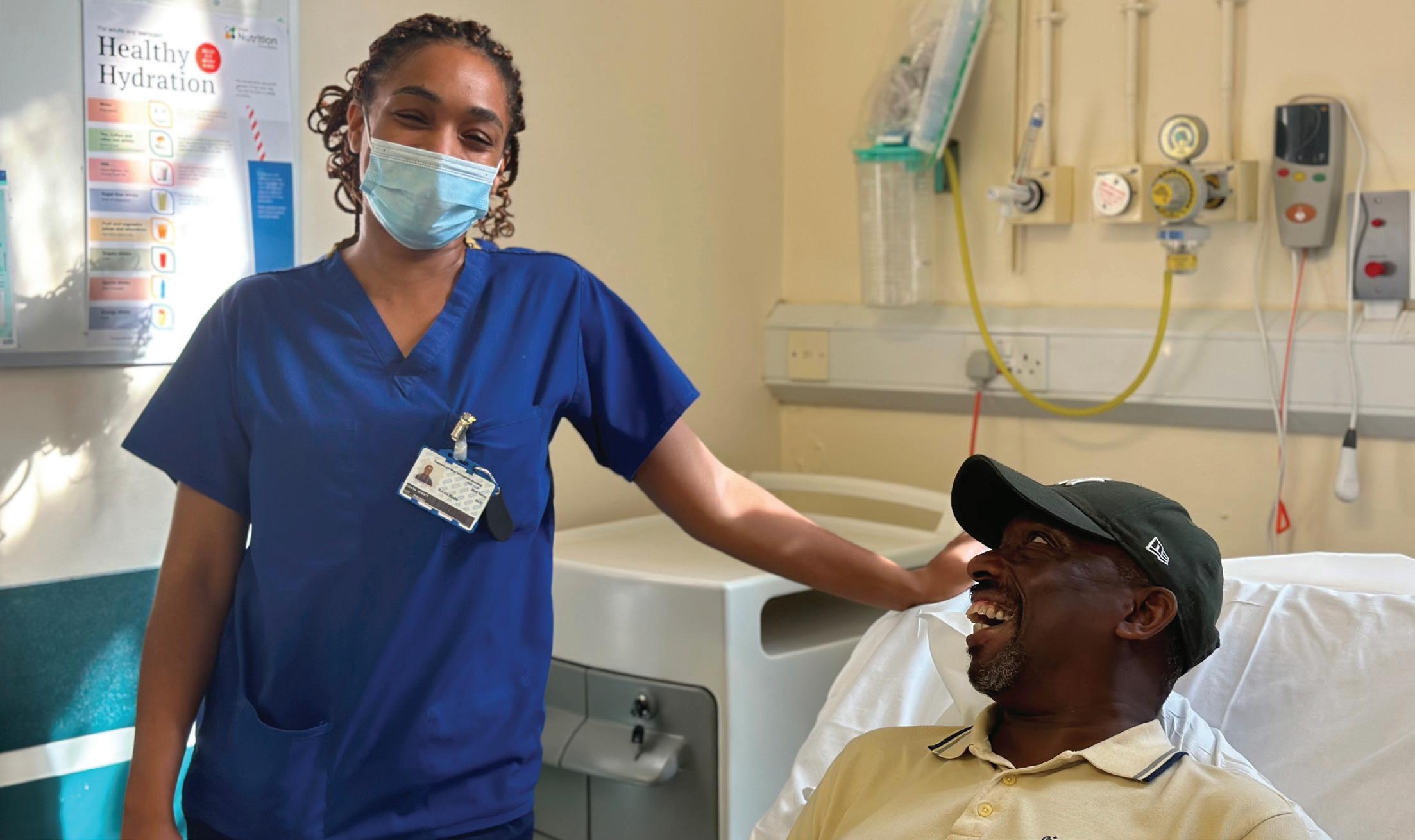
It’s important for colleagues to be aware of how the disease is managed, and so the SCaT team run a monthly educational programme where they teach how this can be done effectively.
The SCaT team provides:
• Day case pain management for sickle cell patients in acute sickle cell crisis.
• Some blood transfusions for sickle cell and thalassaemia patients.
• Outreach support for all our patients when they are in-patients.
• Medical and Nurse-led clinics
• Apheresis in conjunction with the National Blood Transfusion Service
• Joint endocrine, renal and orthopaedic clinics
Sickle cell disease (SCD) is a serious, inherited condition affecting the blood and various organs in the body. It affects the red blood cells, causing episodes of 'sickling', which produce episodes of pain and other symptoms. In between episodes of sickling, people with SCD are normally well. Long-term complications can occur. Good treatment, started early in life, can prevent complications. So, early diagnosis and specialist treatment are advised for SCD.
In the UK, about 15,000 people have SCD. It is more common in people whose family origins are African, African-Caribbean or (less commonly in the UK) Asian or Mediterranean. Birmingham has the highest concentration of patients living with sickle cell outside of London. Across Sandwell and Birmingham we care for over 600 patients living with sickle cell disease and a further 200 patients across the West Midlands region.
Some of the complications include:
Episodes of pain
These are also called a pain crisis or a vasoocclusive crisis. They occur when sickle cells block small blood vessels in bones, which causes pain. Pain usually occurs in bones and joints. The pain can vary from mild to severe, and may come on suddenly. Early treatment is vital.
Acute chest syndrome
This occurs when there are blocked blood vessels in the lungs and can sometimes occur with a lung infection. Acute chest syndrome is very serious. It is the number one cause of death in sickle cell. If suspected, please contact the haematology and critical care outreach team for urgent treatment.
Infections
People with SCD are more prone to severe infections, particularly from certain types of bacteria, which can cause pneumonia, meningitis, septicaemia or bone infections. Symptoms of infection include fever, feeling generally ill, and pain in the affected part of the body.
Priapism
Priapism is a painful erection that occurs without stimulation, sexual desire or arousal.
If the episode of priapism does not settle in one hour patients are advised to go to the nearest ED (emergency department) or the SCAT centre as soon as possible.
If you are interested in attending one of the sessions, please contact Amanda Tembedza at atembedza1@nhs.net. Autumn sessions will be published on trust comms soon.
20
SCaT nurse Ty with patient Alfonso. Both featured in a video explaining more about sickle cell during the awareness month
Sandwell Hospital awarded for commitment to patient safety
Celebrations are in order following Sandwell Hospital being named as a National Joint Registry (NJR) Quality Data Provider, after successfully completing a national programme of local data audits.
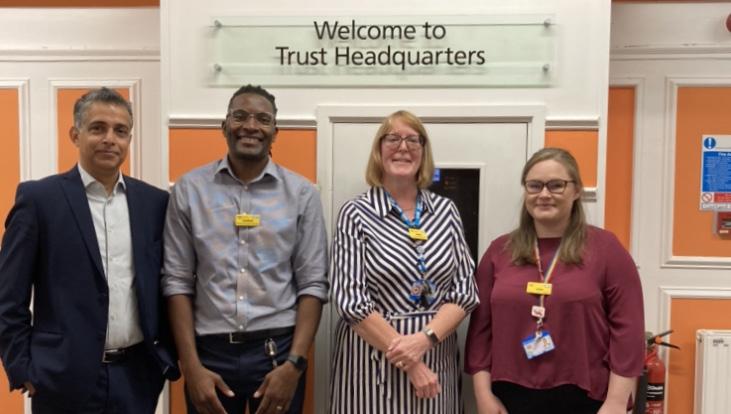
The NJR monitors the performance of hip, knee, ankle, elbow and shoulder joint replacement operations to improve clinical outcomes primarily for the benefit of patients, but also to support orthopaedic clinicians and industry manufacturers. The registry collects high quality orthopaedic data in order to provide evidence to support patient safety, standards in quality of care, and overall cost-effectiveness in joint replacement surgery. The ‘NJR Quality Data Provider’ certificate scheme was introduced to offer hospitals a blueprint for reaching high quality standards relating to patient safety and to reward those who have met registry targets.
To achieve the award, hospitals are required to meet a series of six ambitious targets during the audit period. One of the targets which hospitals are required to complete is compliance with the NJR’s mandatory national audit aimed at assessing data completeness and quality within the registry.
The NJR Data Quality Audit compares the number of joint replacement procedures submitted to the registry to the number carried out and recorded in the local hospital Patient Administration System. The
audit ensures that the NJR is collecting and reporting upon the most complete, accurate data possible across all hospitals performing joint replacement operations, including Sandwell.
NJR targets also include having a high level of patients consenting for their details to be included in the registry and for hospitals to demonstrate timely responses to any alerts issued by the NJR in relation to potential patient safety concerns.
Lauren Wattley, Clinical Effectiveness Manager at the Trust, said: “Improving patient safety is of the upmost importance and something all staff take very seriously. We fully support the National Joint Registry’s work in facilitating improvement in clinical outcomes and governance for the benefit of joint replacement patients. This award means that we have submitted the data correctly for more than 95 per cent of our patients who have received a hip or knee replacement.
“My colleague Sabine Brookes does a fantastic job at collecting and submitting the data on a daily basis. She goes above and beyond because if there is data missing or not correctly documented, she will be proactive to support trauma and orthopaedics in her approach so that this is rectified. Sabine plays is a pivotal part in ensuring that our data meets the 95 per cent standard.
“Another colleague George Mason then completes the data quality check to ensure we meet the 95 per cent standard. He cross
SURGICAL SERVICES
references our HES data with the NJR data and acts if needed. They both play a pivotal role with supporting the NJR lead Manoj Veetil in ensuring as a Trust, we are continuously submitting high quality data to this national audit registry.
“Ultimately if we are confident in our data, we can ensure the best patient outcomes from joint replacement surgery at SWB as good data informs good improvement practice and we’re delighted to be awarded as an ‘NJR Quality Data Provider’.”
National Joint Registry Medical Director, Mr Tim Wilton, said: “Congratulations to colleagues at Sandwell General Hospital. The Quality Data Provider Award demonstrates the high standards being met towards ensuring compliance with the NJR and is often a reflection of strong departmental efforts to achieve such status.
“As well as being a fundamental driver to inform improved quality of care for patients, registry data provides an important source of evidence for regulators, such as the Care Quality Commission, to inform their judgements about services.”
21
Left to right: Manoj Veettil, Cardinal Vutabwarova, Sabine Brookes and Lauren Homer
Student health visitor scoops award from top body
PRIMARY CARE, COMMUNITY AND THERAPIES
Colleague Jane Guy has been recognised by the Institute of Health Visiting for an innovative project which helps to identify speech and language concerns early on in children. The qualified nurse, who is training to be a health visitor, decided to focus on child development as part of her studies and received third prize for the initiative in the form of a leaflet. She said: “I came up with my initiative as part of my leadership module at university, where we were asked to identify a service improvement innovation within our area of practice.
I had already noticed a growing number of speech and language referrals to the Children's Service following the mandated two-year development reviews offered universally to all children as part of the Healthy Child Programme.
“I felt that as health visitors, we were missing the opportunity to identify speech and language concerns early on and that we could be more proactive in promoting speech and language development and its importance for bonding, attachment and the developing baby brain.
“My innovation was for a leaflet to be developed that could be discussed during the antenatal visit and then inserted into the baby's "red book" at the new birth visit. This would not only prompt the health visitor to discuss speech and language development at each contact, but would also provide useful information, tips and support for parents for each developmental stage for the child.
“Additionally, the leaflet would feature a QR code for parents to scan. This QR code is currently already in use by Children's Services (Sandwell Keeps Talking) and links to an informative site where parents can gain further information with links to evidencebased resources and an online self-referral form for speech and language therapy.
“It is hoped that this tool could not only ensure that health visitors discuss language development from antenatal and beyond, but that this could aid in a reduction in speech and language delay, reducing the number of referrals required, as well as enabling early identification of concerns and better outcomes for the child, ensuring that they are ready for school at five years old.”
She added: “I would very much like to be able to work alongside the speech and language team to develop this innovation further and put it into practice. Health visitors are often busy and the demand for the service is high. By keeping communication at the forefront of our minds during each contact, we can continue to promote language development,
provide activities for each stage of development and support parents more effectively when concerns are identified, rather than waiting until the two-year development review.”
Jane originally trained as a nurse in 1996, qualifying as an adult branch nurse in 2000. She added: “Since qualifying as a nurse I have worked in a variety of areas, including acute medical, neurology, GP practice, the 111 service and most recently as a school aged immunisation nurse. I have always felt very passionate about health promotion and empowering others to make positive choices regarding their own health.
“I am also a mother-of-five and it was following the birth of one of my own children that I realised I really wanted to become a health visitor. I had struggled to breastfeed my daughter and it was my own health visitor who encouraged me to attend a local breastfeeding group for support.
“This enabled me to continue my breastfeeding journey but also inspired me to help set a breastfeeding peer support group in Wolverhampton which ran successfully. As a nurse, I most enjoyed my experience in public health settings, so in 2022 I began my own journey as a student health visitor with the Trust and Wolverhampton University.”
NHS Staff Survey 2023
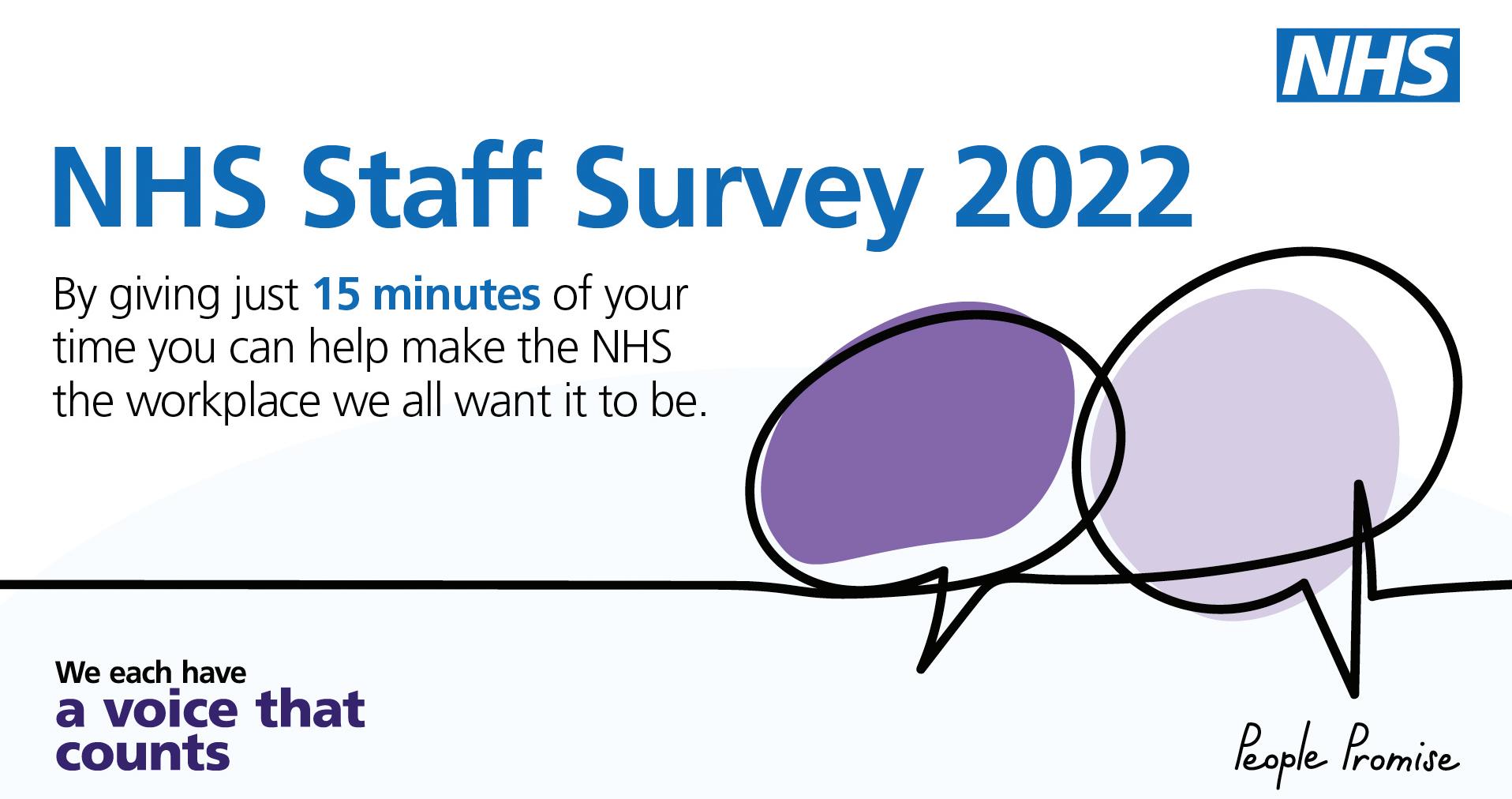
22
Teamwork sees 40 discharges in one day
Earlier this month, we recorded 40 discharges from across the ogranisation in one day, freeing up some much needed capacity.
Together with the ward teams and wider intermediate care services, this is the highest daily discharge rate the integrated discharge hub has delivered since the service began in October 2020.
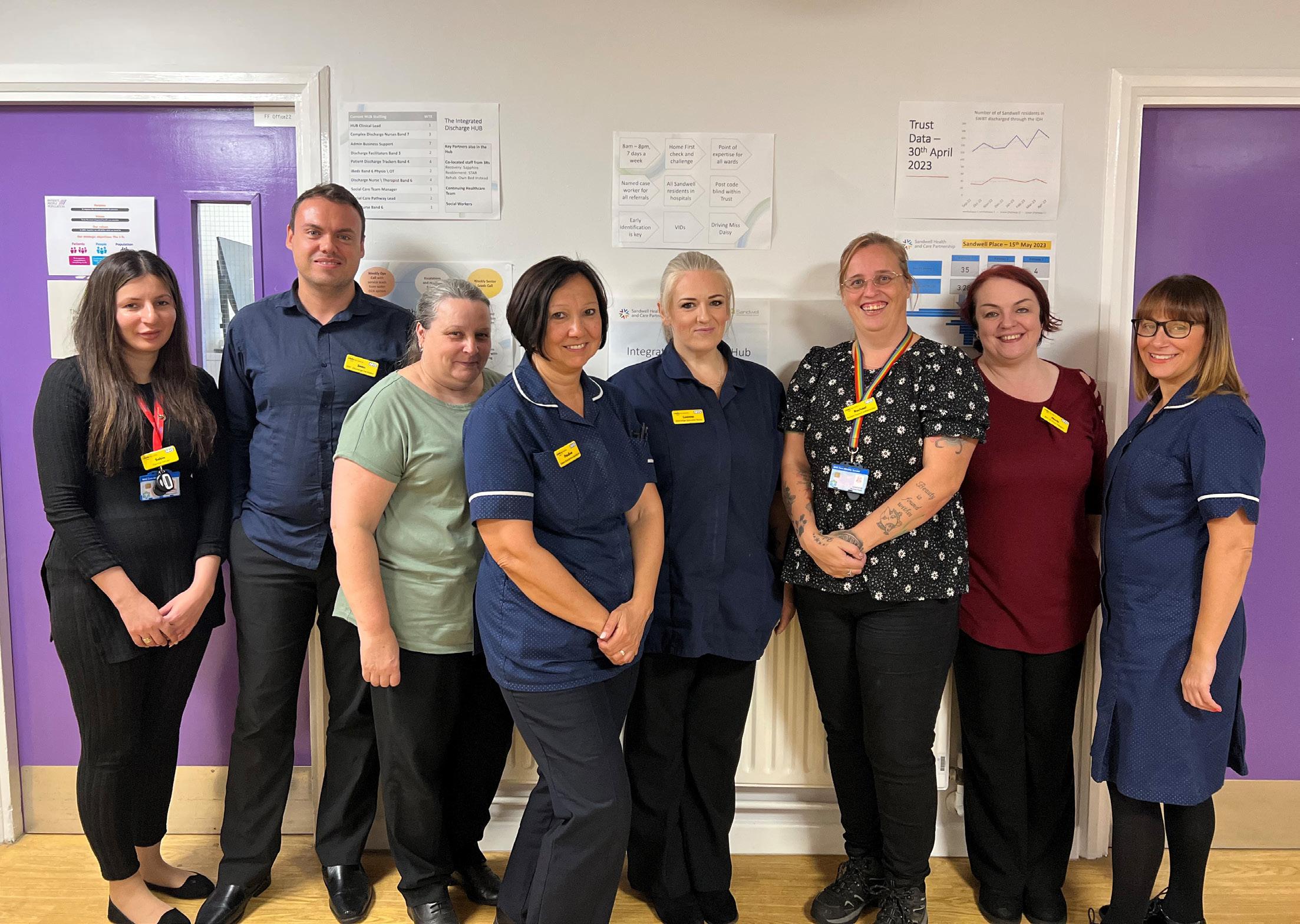
Clinical Lead for the Integrated Discharge Hub said: “The service will be three years old in October 2023 and during this threeyear period there has been a wide breadth of system learning, re-design, pathway development and close partnership working to optimise the efficiency and safety of hospital discharges.”
She added: “The recent added challenges of industrial action has seen services across intermediate care significantly support safe hospital flow with an enhanced focus of why not home, why not today?
“There is an escalation process in place supported by partnership leaders which means barriers to discharge are discussed
swiftly and addressed by having the right expertise at hand, together in one room.”
Discharging 40 patients is a day a is a magnificent achievement especially as the average daily discharge rate is between 21-24 patients per day across the bed bases.
Sarah Oley, Clinical Directorate Lead – iBeds believes that the integrated discharge hub has worked tirelessly to achieve such a huge feat.
She said: “The hub team have worked exceptionally hard over the last few months and the senior management team are very proud of their determination and focus to improve hospital discharge experiences and outcomes.
“The integrated discharge hub's performance is reflective of the strength of our partnerships and focus on intermediate care pathways. Focussed quality improvement work is ongoing to take the learning from successes and embed further good practice.”
Ruth Williams, Head of Intermediate Care echoes these thoughts and believes the Trust can sustain consistency and similar successes going forward.
PRIMARY CARE, COMMUNITY AND THERAPIES
She said: “The ward teams supported recent success by early referral to the discharge hub and completion of the admission checklist on Unity which highlights likely need for social care input or any pre-empted complexities around discharge. This then enables the hub team to plan ahead of the person being medically optimised which can significantly reduce delays in coordinating discharges.
“Discharge planning needs to continue to begin from the point of admission to sustain safe hospital flow going forwards, so we need a big encouragement for all wards to ensure they are completing the admission checklist on Unity which is a mandatory nursing task. Critical tasks also include the pre booking of transport and arranging for TTO's 24 hours in advance of planned discharge.”
23
Our integrated discharge hub plays a vital role in discharging patients at SWB
CORPORATE AND GENERAL NEWS
Kiran went above and beyond to chase up the whereabouts of a family for whom we had been given false information. As a result of her persistence the newborn baby has been safeguarded . Well done Kiran!
Shout out has been a regular feature in Heartbeat and it is fantastic to see colleagues regularly taking the time to give positive feedback to each other.
To nominate a colleague, visit connect2. swbh.nhs.uk/communications/shout-out/, or search 'shout out' on Connect and fill in the form.

Thank you James for all your hard work and patience supporting me with the development and production of the Trust Transition and Young People healthcare newsletter. Your time, effort and professionalism is really appreciated.
I would like to send a shout out to Wendy Kudita for her amazing support and calm and professional approach when she was off duty attending an event outside of her work place. Wendy was a by stander at an event when a gentleman suffered a heart attack, Wendy was calm and jumped straight in to help another colleague to perform CPR after the gentleman had stopped breathing and she was truly amazing, she got the gentleman's pulse back and by doing this until the air ambulance and paramedics arrived, I really believe she saved his life and deserves this shoutout, so personally from myself, the girls and the gentleman's family we cannot thank you enough for having you there that day and you are a true asset to SWBH.
I would like to give a huge shout out to matron Donna James. She is always there in times of need, nothing is ever too big or to little, she always supports and guides me though tough days in a way that empowers me to do better and try again even if things do not work out as planned. I cannot express my gratitude enoughshe has helped and developed me into the manager I am today and couldn't do it without her support and never ending knowledge. Thank you Donna.
I had the pleasure of getting some much-needed IT support from Abdi this afternoon and I just wanted to let you know that you have such a great patience and helpful IT specialist working within your team. He was very accommodating and responsive to my questions. He went above and beyond and kindly showed me how to use the online MS Office suite just when I thought I would not be able to edit my saved word document. This was all done within less than 10 minutess of the call. The service was outstanding and I was very impressed with the quality of service I received. Please thank him on my behalf again for helping make my job a little easier.
Thank you to Joelle for her commitment to the trust promises and her patient advocacy in her support of patient journey and experience.
Joelle went above and beyond supporting the wishes of both patient and family.
Laura Melough was extremely helpful, caring and sympathetic towards me when I hurt my neck/shoulder. Laura directed me to Physio team at Sandwell and I was able to book myself to get checked. I had the pain for number of days and had trouble getting GP appointment but with Laura's guidance I managed to get seen very quickly. Laura also ensured I took care of myself during my shifts and informed my colleagues to support. I worked with my colleague Karen Mills. Karen was extremely supportive and helpful throughout my shifts with her. Thank you all.
From
A big thank you to the city discharge lounge team for having a positive impact on the number of discharges leaving our medical beds earlier in the day. Every day multiple patients are 'pulled', collected and welcomed into the lounge before being discharged. They have effectively changed the way the discharge lounges are efficiently utilized and their feedback very positive. Well Done Jessel, Elaine, Vickey, Sony, Juliette, Susan, Cynthia, Balvinder, Rizwana, & Angela
Huge shoutout to Charlotte for the exceptional way she has handled herselfwhile being very short staffed in the dept. On top of being extremely efficient - she was calm - smiling the whole time. Even under these arduous circumstances it was an absolute pleasure working with her. Thank you...
We had a lady this week who needed to get to ED. She was really struggling to walk and very dizzy. Her son who was with her was really worried about her. She managed to make it to the Sandwell main entrance where we sat her to rest while we tried to find a wheelchair. Winnie was really helpful in locating a one to help the lady and took her down to the ED herselfWinne was a real star and went out of her way to help the lady and her son. Thank you Winne!
From – Jamie Emery
For always being so helpful, at any time in the day and for keeping everyone in the dispensary smiling with your happy nature... its appreciated!
From – Libbi Tudor
Dan has been extremely supportive in the recruitment process for our brand new Youth Worker roles. It has involved additional meetings and communications to work collaboratively with our Black Country colleagues. Dan has provided responsive, patient and professional support to me throughout the process. Thank you so much!
24
To – Abdi
From – Adelaine
To – City discharge lounge
From – Jody Stubbs
To – Kiran Ralhr
From – Nicola Ingram
To – Dan Hamblett
From – Kelly Edie-Fisher
To – Wendy Kudita
Xxx
From – Kayleigh Stone
To – Joelle Smith
From – Samantha Walden
To – Donna James - Matron Trauma and orthopedics
From – Sophie Barker
To – James Reynolds
From – Kelly Edie-Fisher
To – Charlotte Hughes - Phlebotomy
From – Kam Duggal
To – Winne - Lyndon Ground Paediatrics
To – Paul Welcome
To – Laura Melough and Karen Mills
– Kelly Edie-Fisher
Cleanliness issues at SWB?
Dear Heartbeat,
The outpatients department area does not seem to be being cleaned regularly. It is uncomfortable as a staff member to have to keep leaving the office and finding tissues all over the floor, bandages with blood on and even a sanitary pad open on the floor right in front of the exit. Outside of outpatients, just by the urgent treatment centre there is also frequently discarded bandages and cotton wool with blood on them. As a hospital you would expect the premises to be clean and welcoming. However the current sightings are not promoting this. If a member of the public attending the hospital took a photo of this and put it on social media, it would not look good. How regularly should the premises be being cleaned? Are there clinical waste bins within the UTC area for patients to use?
Anonymous
Dear Anonymous,

Thank you for the information and we apologise that on this occasion we didn’t meet your expectations. We’d like to assure you that as an organisation we take our
environmental cleanliness very seriously. We adhere to our cleaning charter commitment and star ratings across the sites working with different stakeholders of the Trust.
We have cleaning schedules in both inpatient and outpatients areas. Under new NHS cleaning standards 2021 (frequency risk 5) our compliance was above the 80 per cent target at last two audits of the outpatient area.
We encourage colleagues to notify us immediately when they spot an issue with cleanliness on our premises.
We send assistance immediately upon receiving any request either through Unity or by calling us directly (extension 3643). Also, we have clinical waste bins located strategically in the Urgent Treatment Centre for patients to use.
To conclude, we will monitor the areas of concern and liaise closely with our colleagues at Urgent Treatment Centre.
Kind regards,
Aner Marcelo Head of Support Services
25 Letters, of less than 200 words please, can be sent to the Communications Department, Trust Headquarters, Sandwell Hospital or by email to swb–tr.SWBH–GM–Heartbeat@nhs.net
YOUR RIGHT TO BE HEARD Join Our SWB family staff only Facebook group A place for you to keep up to date with important Trust information, share good news and get to know your colleagues. How to join Search SWB Family and click join or scan the QR code You will be asked three simple questions to help verify your identity. #ourSWBfamily
Wave goodbye to…
Eileen Dolan, Macmillan Palliative Care Lead Nurse, will be retiring from SWB after 38 years a registered nurse.
Eileen started her nursing training at what was then known as Dudley Road Hospital in 1985.
“After qualifying I worked in gynaecology and later as a ward sister on the St. Chads Unit (gynae/breast oncology) and then I progressed to the role of a clinical nurse specialist in gynae oncology at Sandwell Hospital which I undertook for seven years,” said Eileen.
“Following this role, I joined the palliative care team as a clinical nurse specialist where I was able to pursue my interest in palliative care, which is a post I have remained in for the last 18 years.”
She added: “I have cared for lots of patients and their families during my time at the hospital which I have relished, and it has been a privilege to work with so many excellent ward and community teams over the years. Working in palliative and end of life care through the COVID-19 pandemic was unprecedented but we all got through it together.”
Eileen has had a positive impact on many of her fellow colleagues across SWB during her time here.
Sue Hunt, Palliative and End of Life Clinical Service Manager has worked with Eilleen for over 15 years and said: “I could always ask Eileen for professional advice and she was always willing to share her knowledge. She was a great asset to the team and will be missed by us and our patients.”
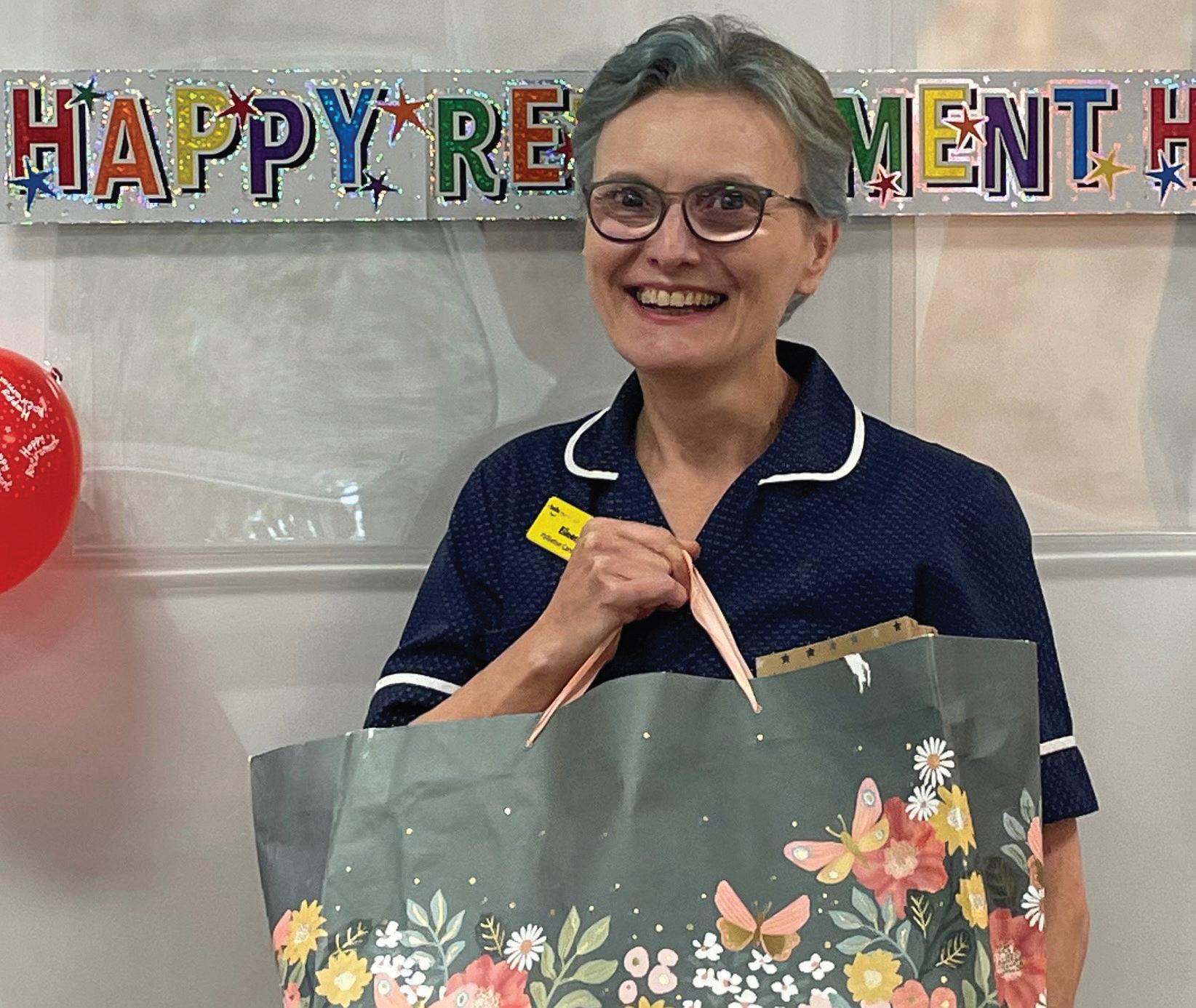
Lyndsey Slater, Specialist Palliative Care Nurse spent many weekends working with Eileen and said: “I always felt privileged to be working with someone who has such experience and knowledge. Eileen was always passionate and caring with everyone she interacted with.”
Mariam George, Consultant in Palliative Medicine echoes these thoughts and added: “Eileen will always be remembered fondly for her gentle natured ways. I'm thankful for all the support she has given me.”
As part of her retirement, Eileen is going to have a well-deserved rest and enjoy spending time in her allotment and with her cats.
Happy retirement Eileen!
26 26
Eileen Dolan
Macmillan Palliative Care Lead Nurse
Eileen Dolan is retiring after 38 years as a nurse
Richard talks about: Prioritising the way we work
Richard Beeken, Chief Executive
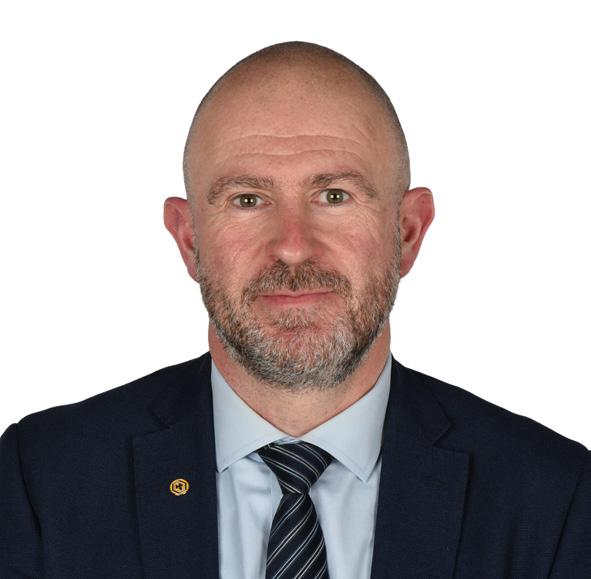
RICHARD'S LAST WORD
Over the last few months in this column, I have written about our annual plan and the 14 objectives which we are committed to delivering for the end of the financial year.
In the time that we agreed and published our annual plan, the landscape has changed to some extent.
Firstly, the impact of the financial challenges we face cannot be ignored and that is something that I and senior leaders across our organisation are working towards. We have a financial recovery plan in place which are performing well against, although there is still much to do. We can and must achieve better utilisation of our clinics and theatres and we can and must improve our over-reliance on agency and locum staff through better workforce planning and controls.
Secondly, the Midland Met is beginning to feel very real as we look to move in next year. This means the demands on the organisation to get us ready to move in are growing with every passing day, whether that be through delivering a huge programme of clinical pathway changes or in the delivery of formal organisational change for nearly 6000 colleagues.
These challenges are being met by the same small group of leaders in clinical and operational roles – to redesign services, handle the management of change programme as well as deliver elective and urgent care recovery plus handling industrial action.
In order to ease the challenges colleagues are facing I decided to look at how we could reduce our priorities whilst still having an impact on the annual plan objectives. So, during August I met every executive team member and the leadership teams of all five of our clinical groups and set out the priorities I would be holding them account to in addition to the business-as-usual expectations.
The three priorities are:
1. Deliver the MMUH programme workstream requirements to secure service transformation, service quality/safety, workforce engagement and preparedness and deliver the early stages of the strong MMUH benefits case.
2. Deliver our financial recovery plan, to assure the public we are managing public money wisely and do not materially harm our or our host system’s ability to secure additional revenue or capital funding for longer term investment in our IT, our estate or our workforce, by virtue of being in significant deficit.
3. Deliver improved workforce optimisation through a clear recruitment plan, improved attendance management and agency/ locum discipline, thereby enabling better safety and continuity of care in our services and ensuring we have the right ground conditions in place on which to “land” the MMUH next year.
It is these three priorities which we now need to assess our 14 annual plan objectives against. The Board is in support of this and now each subcommittee will assess their own oversight of our annual plan objectives against those three filters.
There are clearly initiatives and projects which are underway, some of which are explicitly linked to our annual plan, some of which are not. The Board subcommittees will now as a minimum accept that some of these may not be delivered at the pace originally intended. We may also consciously choose to actively defer some projects to release some capacity at the margins for our leadership teams.
Listening and acting on feedback
You will begin to feel the scale of change and pace over the coming weeks. Please do engage with your line managers about how you can contribute to what we are asking you to deliver.
And there is an opportunity for you to have your say on this and other matters in the upcoming national staff survey which launches in October and will be open for two months. For the first time this year our active bank only staff will also be given the opportunity to have their say.
Please do take the time to give your feedback when you receive the survey. Our people plan was developed to support you to have a great experience at work and the staff survey responses play a central role in that.
Your feedback is taken seriously and is reviewed and discussed along with actions to take at all our senior meetings including execs, Board, people committee and Trust Management Committee.
You too also the have the opportunity to discuss the feedback for your area with your own managers to enable local actions that are important to you.
27
Want to relax and unwind in a safe place? Visit the Wellbeing Sanctuary and enjoy a range of free treatments including a massage, meditation and relaxation hypnotherapy. Call 0121 507 5886 to book your free session today.
Doctor takes on Berlin marathon to raise awareness around wellbeing
YOUR TRUST CHARITY
@SWBHCharity To donate to the Your Trust Charity text
“SWBH16 £5” to 70070
Dr Sarb Clare MBE took on the gruelling Berlin Marathon to raise money and awareness for the health and wellbeing of both patients and medics.

Taking part in the challenge on 24 September, the Acute Medical Consultant and Deputy Chief Medical Officer explained she was raising funds for two charities close to her heart.
“Money will go towards enhancing the garden area and the arts programme at the Midland Metropolitan University Hospital, due to open in 2024, and for the charity Doctors in Distress, which raises awareness of mental health and suicide within the healthcare profession,” she said.
“These two charities are both extremely important to me. Our new hospital will not only treat some of the sickest patients in our community but will also be a hub for our population so providing areas of relaxation for patients, visitors and staff is something we are developing.
“A winter garden will be abundant with greenery and enclosed areas where people will be able to sit and reflect. It will be a place for people
to focus on their mental health and wellbeing. The arts programme is about bringing our community together and giving them an opportunity to take part in various activities, from crafts to performing arts.”
The medic is also a supporter of the charity Doctors in Distress and recently hosted a special tree planting ceremony at Sandwell Hospital attended by Adam Kay, the author of the book turned BBC TV show This is Going to Hurt.
She added: “One doctor across the UK ends their life every three weeks. The stigma of talking about mental health needs to be eroded and accessibility
to support and help must be a priority. We have a very supportive health and wellbeing programme for staff at the Trust and continue to develop this, tailoring it to the needs of those who access it.”
To donate, go to https://donate. giveasyoulive.com/fundraising/sarb-isrunning-the-berlin-marathon-for-swbwe-are-metropolitan-and-doctors-indistress
2023 staff lottery results
1st £142
Anoynmous
For further information on the scheme contact Pat Hunt on 07990 351490 or email patriciahunt@nhs.net
2nd £85.20
Emma Morris
3rd £56.60
Anoynmous
Don’t forget that Your Trust Charity lottery costs just £1 a month and anyone who works for the Trust can join. Payment is deducted from your wages each month. To take part email johnny.shah@nhs.net.
MP6846
September
Dr Clare at the London Half Marathon earlier in September

















































































